
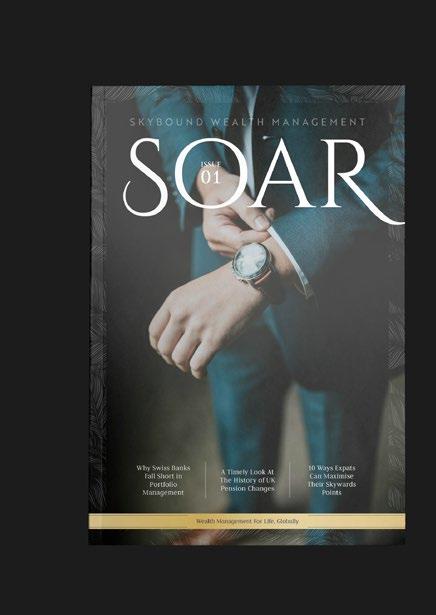
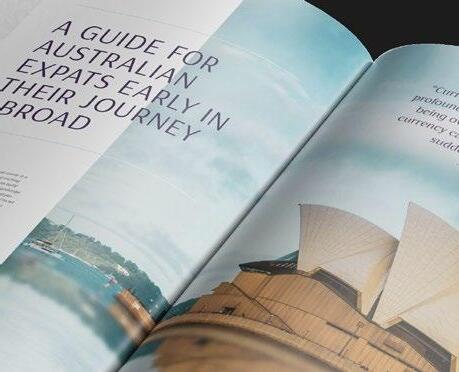

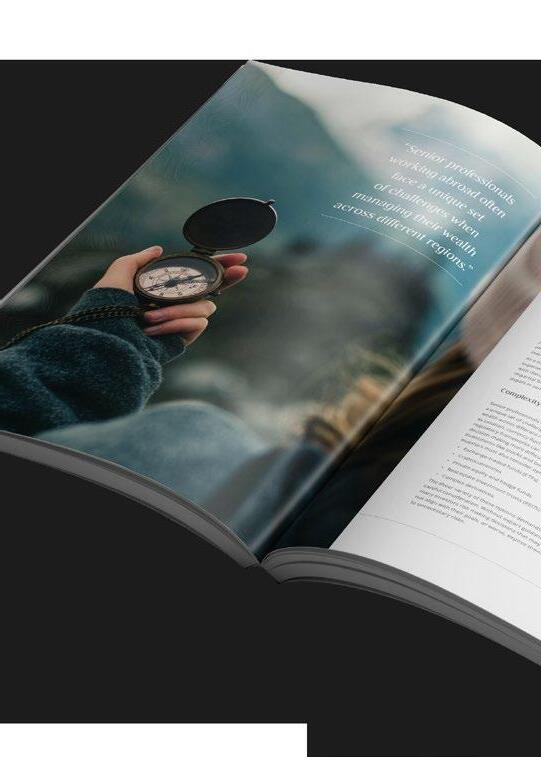
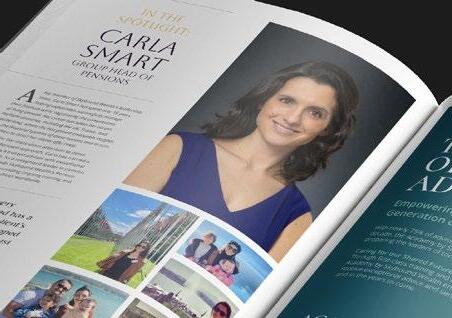
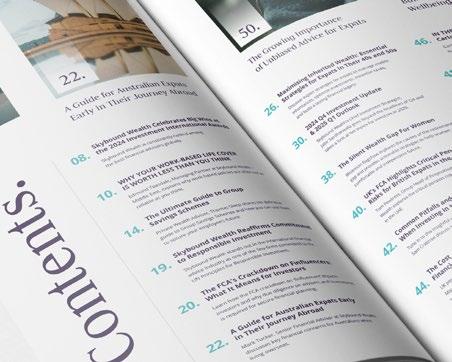

















Mike Coady Chief Executive Officer
Peter Gollogly Regional Director
Paul Pavli Executive Director - Cyprus
Josh Watson Group Head of People
William Bailey Global Partners Manager
Taylor Condon Area Manager
Bethany Ward Partnerships Manager
Ashley Eyre Head of Compliance - UK
Michelle Koh Operations Manager - Asia




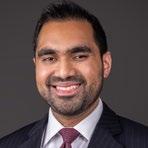




Husain Rangwalla Chief Technology Officer
Carlo Casaleggio Group Head of Compliance
Veronica O’Brien Group Head of Corporate Affairs
Craig Stokes Managing Director - UK
Adeeb Khan Team Lead - Technology
Dmitriy Ermakov Group Head of Marketing
Danny Sutherland Group Financial Controller
Maria Darmanin Demajo Operations Manager – Cyprus
Jenna Cochrane Administration and Operations Manager - USA
Skybound Wealth Management stands as a benchmark of excellence in the world of international wealth management. As an independent firm, we pride ourselves on delivering bespoke financial solutions tailored to meet the unique needs of our global clientele. Our innovative approach combines the agility of a boutique firm with the expertise and resources typically associated with a major financial institution.
Follow Us On Social Media
Search for ‘Skybound Wealth’









Josh Burton Chief Financial Officer
Tom Pewtress Group Head of Proposition
Carla Smart Group Head of Pensions
Bryan Bann Regional Manager
Richard Gartland Area Manager - Cyprus
Jaya Prakash Goulikar Head of Compliance – Middle East
Elyka Ygnacio Operational Finance Manager
Tyrone Witehira Regional Manager - Asia
Maria Nikolaou Executive Director - Cyprus
$1.3billion
of client assets under management
6,000 +
international clients & growing

This year, Skybound Wealth was named Company of the Year and recognised for Excellence in Advisory Practice and Excellence in Client Service across multiple regions. These awards are a proud moment for us, but they’re really about you. Your trust, loyalty, and partnership made them possible.
For more than two decades, we’ve built Skybound Wealth to serve the modern international investor: people whose lives, careers, and families move across borders but who expect the same standard of advice wherever they are. That means global regulation, personal relationships, and technology that makes planning clear, accountable, and portable.
In this edition, you’ll find articles that speak directly to that mission, from tackling tax traps and pension planning, to managing risk, protection, and opportunity across jurisdictions. You’ll also see how we’re continuing to evolve through innovation, education, and inclusion, ensuring that world-class advice remains accessible to everyone who needs it.
Thank you for continuing to trust us with your goals and your future. It’s a responsibility we take seriously, and one we’re proud to keep earning, every day.
Mike Coady
Mike Coady Chief Executive Officer

08. Why Skybound Wealth Stands Out
The Human Side Of Money: A Complete Guide For Expats
20. Why High Earners Go Broke: Avoid These Financial Traps And Secure Your Future 24. From Planning To Doing The Hardest Financial Step
28. Life Insurance For Expats: It’s Not About You. It’s About Them
30. How Skybound Wealth Supports The Modern Expat Investor
34. Swiss Vested Benefits: 10 Misconceptions That Could Be Costing You
40. Thinking Of Moving Your Business To The UAE? Here's Why It’s A Smart Move
44. Why Expats Shouldn’t Ignore Old Workplace Pensions








114. In The Spotlight: Zain Shahin 24. 30. 92. 74. 44.
48. How British Expats Can Avoid UK Tax On Their Pension Income
52. Unlocking Saudi: Why The Kingdom’s New Property Law Could Redefine Global Investment For Expats
56. Skybound Wealth Launches Athletes & Creators: Supporting Professionals Beyond The Spotlight
60. The Financial Mirage Of Gulf Expats: Why TaxFree Salaries Disappear Without Planning
64. Two Wallets, One Plan: How Couples Can Manage Money Together
66. Success Without Structure Is Just Noise: Why Financial Planning Is About More Than Money
70. Skybound Wealth Launches Moneymap
74. The New Faces Of Wealth: How Gen Z Millionaires & Billionaires Are Reshaping Global Finance
80. Why Playing It Safe With Cash Could Be Your Riskiest Move Yet
84. Spotlight On The Pension Dashboard: A Game-Changer For Savers
88. UK Pensions & Inheritance Tax: What Every British Expat Needs To Know
92. Renting Out Uk Property As A Spanish Tax Resident: What You Must Know In 2025
96. Understanding Financial Emigration & Tax Emigration For South Africans Abroad
100. Moving Back To The UK? Here’s How To Avoid A Nasty Surprise From HMRC
104. Quarterly Report: Q1 2025 Review & Q2 2025 Outlook
110. Five Tax Traps For Brits Moving To Spain
112. Less Than 1 In 10 People Seek Financial Advice In The UK. Don’t Be One Of Them
It’s easy to say you put clients first. At Skybound Wealth, we built an entire business model to prove it.
From multi-jurisdiction regulation to proprietary technology and a client experience measured in engagement, not promises, our difference isn’t in what we claim, it’s in what we deliver.
Today, Skybound operates across five continents, serving more than 6,000 clients and managing over $1.3 billion in savings and investments. We’ve been recognised with multiple industry awards, most recently Company of the Year and Excellence in Client Service at the 2025 Investment International Awards.
But the real achievement lies behind those results: the systems, people, and standards that make excellence repeatable
How we turned a promise into a platform for global advice
IT’S IN WHAT WE
When you hold licences across the UK, EU, Switzerland, UAE, USA, and beyond, global advice stops being a slogan and becomes a service.
A Dubai family with assets in Cyprus and the UK doesn’t need three advisers. One Skybound adviser can manage their portfolio and protection seamlessly, drawing on multiple licences under one roof. The result: faster decisions, fewer handoffs, and one standard of advice.
Investment Depth That Clients Can Feel Our investment edge comes through Skybound Capital, our global investment partner managing over $2 billion across institutional mandates, funds, and discretionary portfolios. With dedicated CIOs and strategists in London, Hong Kong and South Africa, clients benefit from real insight, not outsourced opinion. It’s a level of investment governance few advisory firms can claim, and even fewer can replicate.
Our technology wasn’t built to automate advisers out of the process. It was built to put them, and their clients, at the centre of it.
The Plume Advice Suite powers the entire advice cycle: from discovery and solutionfinding through to investment selection, licence routing, and instant report generation. It delivers regulator-ready recommendations faster, with less room for error.
MoneyMap, our interactive forecasting tool, turns financial planning into real-time visual decisions. Clients can model outcomes, stress-test goals, and see instantly how small changes alter their future.
Advisers manage it all through the Client Manager Dashboard, while Client App 2.0 keeps clients informed minute-by-minute, valuations, reviews, communications, all in one secure place. This isn’t technology for technology’s sake. It’s clarity, accountability, and trust, made visible.
Exceptional service doesn’t live in quarterly reviews, it lives between them.
We’ve built a communication rhythm that keeps clients informed, educated, and supported all year. Bespoke review packs. SOAR, our quarterly magazine for internationally mobile professionals. Altitude, our monthly newsletter now read by more than 6,000 subscribers. Webinars, events, and ondemand insights that turn complex markets into clear action.
But numbers only tell half the story. The real measure of success is that clients no longer need to ask what’s happening with their plan, they already know.
Behind every system stands a person who makes it work.
We now have over 70 qualified advisers, 12 chartered and a significant training budget dedicated to continuous professional development.
Our Academy brings new advisers through a structured pathway of mentorship and technical mastery. While the book buyout scheme secures long-term continuity for clients and advisers alike.
Our employee Net Promoter Score of +37 tells its own story, good people come here, and they stay. Because when you give professionals the right tools, culture, and trust, excellence becomes the default.
In a world where opportunity often outpaces scrutiny, discipline is a competitive advantage. Every product and provider passes through a centralised due-diligence process that prioritises transparency, governance, and sustainability. We’ve said no more than once, and we’ll keep doing so.
Boring on purpose? Maybe. But we’ll always choose predictable over precarious, and principle over profit.
We believe transparency builds trust. That’s why every client has full visibility of costs, performance, and progress through their digital dashboard, no hidden fees, no grey areas, no surprises. In a market too often defined by opacity, we prefer daylight.
“From multi-jurisdiction regulation to proprietary technology and a client experience measured in engagement, not promises, our difference isn’t in what we claim, it’s in what we deliver.”
When you combine global regulation, proprietary technology, measurable service, and exceptional people, something powerful happens. Advice becomes joined-up.
Clients feel it. That’s why recognition follows, not because we chase trophies, but because we chase consistency.
At Skybound Wealth, our goal has never been to be the biggest. It’s to be the most trusted. And that trust is earned one client, one plan, and one result at a time.
We believe world-class advice should feel personal. It’s why our advisers build lifelong relationships, not transactions, and why every Skybound client, no matter where they live, experiences the same clarity, accountability, and care.
“BUT NUMBERS ONLY TELL HALF THE STORY. THE REAL MEASURE OF SUCCESS IS THAT CLIENTS NO LONGER NEED TO ASK WHAT’S HAPPENING WITH THEIR PLAN, THEY ALREADY KNOW.”



Written by Mike Coady Chief Executive Officer
Money has always been more than numbers. It is memory, identity, fear, pride, and hope rolled into one. For expats, money carries even more weight.
You’re not just building a nest egg. You’re balancing currencies, tax regimes, uncertain career paths, family obligations across borders, and the quiet question: Will I be okay?
I understand how overwhelming financial planning can be. At Skybound Wealth, we're committed to giving you clear, straightforward advice. No jargon, just a plan you can trust. Most financial articles start with charts and formulas. This one begins with people. Because after advising expats for decades, I’ve seen the same truth over and over: clients don’t make financial decisions with spreadsheets alone. They make them with hearts racing, palms sweating, sometimes with tears in their eyes. Financial planning is technical, but at its core, it is human.
This guide is for those who want to master both sides: the mechanics of building, protecting, and transferring wealth and the emotional reality of making decisions that truly stick.
The world is moving fast. Inflation eats away at savings, markets rise and fall in unpredictable waves, and life expectancy is climbing steadily. The average expat today will live longer, move more often, and face more complex tax rules than any generation before.
And yet, many still delay planning. Some keep everything in cash “until things feel clearer.”
Others chase get-rich-quick investments because a friend in Dubai or Singapore said it was “guaranteed.” Some even rely on company benefits without checking if they’re transferable when they move.
Here’s the harsh reality: inaction is also a decision. Waiting quietly is still choosing. But it’s choosing erosion over growth, uncertainty over clarity.
What underpins this hesitation? Emotions.
They say: “I’ll think about it,” which really means, “I feel overwhelmed.” Or: “Let’s wait and see,” which is fear dressed up as logic.
“Financial planning is technical, but at its core, it is human.”
Every plan is unique, but the foundations are consistent. For expats especially, these blocks create a structure strong enough to withstand moves, market crashes, and unexpected shocks.
Lifestyle & Cashflow Modelling
A solid plan starts with clarity. Lifestyle modelling isn’t theoretical; it turns your questions into numbers. What if you retire at 55 instead of 65? How would your plan shift if interest rates rose by 3%? Could you fund education in euros while earning in dollars? For globally mobile families, this process is often a revelation. They can finally see their life laid out, not as abstract goals, but as a living roadmap. Tools like MoneyMap and other modelling software make it visual, interactive, and real.
Savings & Investing
Even when income is strong, volatility can make it hard to build lasting wealth. Without long-term structures, many find that high salaries don’t translate into financial security. Steady investing across markets, currencies, and asset classes builds resilience. Equities provide growth, bonds offer stability, alternatives add diversification, and liquidity ensures you can handle life’s curveballs. The goal isn’t to “beat the market” but to remain invested long enough for compounding to work its quiet magic.
One truth I’ve seen repeatedly: the wealthiest plans collapse without protection. Illness, accident, or death abroad can turn financial independence into financial chaos overnight. Critical illness cover, disability protection, and international health insurance aren’t optional, they’re non-negotiable foundations.
Retirement & Pensions
Every country has its own rules. The UK offers State Pensions, SIPPs, and occupational schemes, South Africa relies on retirement annuities, and the US has 401(k)s and IRAs. For globally mobile families, the challenge isn’t simply choosing a pot, but integrating them across borders. Currency, tax, and access rules make careful coordination essential.
Tax & Estate Planning
The uncomfortable truth is that governments change the rules faster than most people change houses. Expatriates need to consider where their assets are domiciled, whether their wills cover multiple jurisdictions, and if cross-border inheritance tax could apply. Failing to plan in this area doesn’t just cost money, it can leave families exposed, vulnerable, and sometimes entangled in disputes across borders.



“Financial planning isn’t about predicting the future. It’s about preparing for uncertainty. The approach I use with clients has three steps: first, we identify the risk or opportunity. Next, we acknowledge the emotion it brings; fear, anger, sadness, or hope. Finally, we reframe it and provide a clear, actionable solution.”
This is where the wheel of emotions comes in. Most advisers (and most articles) stop at surface words: worried, angry, happy. But clients rarely live on the surface.
A client who says, “Your fees are too high,” might not be angry. They might feel disrespected, like their trust is being taken for granted. Another who says, “I’ll think about it,” isn’t calm and rational. They may feel overwhelmed, paralysed by choice and terrified of making a mistake.
When advisers miss this, conversations stall. When advisers notice and name it, trust deepens.
The Angry Client: “My last adviser was useless.”
On the surface, it’s anger, but underneath, it’s a sense of betrayal and resentment.
Acknowledging this, you might respond: “I can see you felt let down. Let’s rebuild this with complete transparency so you feel secure again.”
The Delaying Client: “Let me wait and see.”
It seems calm, but it masks fear and uncertainty.
A good response could be: “Waiting feels safer when things feel uncertain, but doing nothing has its costs too. Let’s model some scenarios so you feel more in control.”
The Regretful Client: “It’s too late for me.”
It’s not just sadness; it’s a sense of helplessness and vulnerability.
The right response reminds them: “It’s never too late to improve your future. Even small changes can create freedom. Let’s take back control together.”
The wheel isn’t perfect, but it gives advisers, and clients, a vocabulary for what’s really happening beneath the words.




Financial planning isn’t about predicting the future. It’s about preparing for uncertainty. The approach I use with clients has three steps: first, we identify the risk or opportunity. Next, we acknowledge the emotion it brings; fear, anger, sadness, or hope. Finally, we reframe it and provide a clear, actionable solution.
Practical tools underpin this process. Portfolios are stress-tested against market crashes. Liquidity is planned for job loss or relocation. Healthcare costs, particularly post-retirement, are factored in. Income is diversified across pensions, investments, rental properties, or even part-time consulting.
When clients see not just numbers but resilience, they move from feeling powerless to confident, ready to face whatever life throws at them.
A good adviser does more than optimise tax wrappers or select funds. They translate emotion into action. They sit with clients who feel vulnerable, exposed, or betrayed, and help them move toward security, fulfilment, and pride. DIY planning often skips this step. That’s why many self-taught expats end up misaligned, underprotected, and stressed.
Advisers bring perspective, spotting blind spots clients cannot see. They provide accountability, ensuring decisions get implemented. They offer objectivity, guiding through noise and panic, and they bring empathy, understanding not just the numbers but the fears and hopes attached to them.
Financial planning involves spreadsheets, risk analysis, tax structures, pensions, and insurance. But at its heart, it’s also about real people: the father who feels proud knowing his family will be secure, the mother who once felt exposed but now has peace of mind about retirement, and the couple who once felt betrayed but now trust again.
“Most advisers stop at surface words: worried, angry, happy. But clients rarely live on the surface.”

Written by Kieran Tween Private Wealth Manager
We often hear high earners say, “If I make enough money, everything else will take care of itself.” But this is a dangerous assumption that leads many into financial ruin. As someone who has worked with business owners, professionals, and executives making six or even seven figures, I’ve seen this happen more times than I can count. Despite a substantial income, many still find themselves living paycheck to paycheck. So, how can this be?
The more you earn, the more you tend to spend. A bigger house, a luxury car, lavish holidays, it’s easy to fall into the trap of believing that as long as your income grows, you’re financially secure. But ask yourself this: how long could you maintain your current lifestyle if your income disappeared tomorrow?
The Truth:
Living rich doesn’t equal building wealth. It’s a trap many high earners fall into, convinced that their income will always be there to support them. The reality? Without a strategic plan, even a high salary can lead to financial disaster. What to Do Instead:
Sure, increase your income, but make sure your assets grow at an even faster pace. It’s not just about how much you earn, it’s about what you keep and how well your wealth works for you even when you’re not actively earning.


Relying on a high salary or successful business to fuel your wealth is risky. Jobs aren’t for life. Businesses fail. Markets change. If all your money comes from active income, you’re one mistake away from instability.
What to Do Instead:
Diversify. Put your income into investments, property, stocks, or assets that work for you even when you’re not. Building wealth is about making your money work for you in the long term.
I’ve seen two extremes: high earners who hoard cash, letting inflation erode its value, and those who gamble on high-risk investments without a strategy. Both are dangerous. Sitting on cash means your wealth isn’t growing, and high-risk bets are no better than gambling.
What to Do Instead:
Have a structured investment plan. Invest in diversified assets that build wealth steadily over time. Wealth isn’t about making a big, risky bet; it’s about consistent, strategic growth.
As your income grows, so do taxes. Without tax-efficient structures, you could be losing a significant portion of your earnings. And if you’re not protecting your assets, a lawsuit or business failure could wipe it all out.
What to Do Instead:
Work with professionals who understand tax efficiency and asset protection. Protect your wealth through proper planning and structure, ensuring it continues to work for you for years to come.

“Despite a substantial income, many still find themselves living paycheck to paycheck.”

The Silent Killer of Wealth
It’s easy to say, “I’ll deal with this later.” But “later” rarely comes. By the time most high earners realise the importance of financial planning, it’s often too late to reap the benefits of years of lost growth.
What to Do Instead:
Start today. The best time to take control was yesterday. The second-best time is now.
High earners often assume that as long as they’re earning a good salary, they’re financially secure. But without proper planning, those earnings can quickly vanish in a haze of poor spending, missed opportunities, and financial missteps.
If any of this resonates with you, you’re not alone. But here’s the good news: it’s never too late to make a change. You don’t have to do it alone.
Let’s have a conversation about how you can structure your wealth, avoid common financial traps, and build long-term security. No pressure, no sales pitch, just honest advice to help you secure your future.


Imagine a world where your investments deliver a consistent return, year after year. Argen Capital offers exactly that – a remarkable opportunity to earn an 8% fixed return per annum, designed for those who seek stability and security.
Our innovative approach, developed by Skybound Capital, provides you with the peace of mind that comes with a steady income stream, while also allowing you to take control of your financial future.
Discover how Argen Capital can work for you. Contact us today to learn more about this exclusive investment opportunity and take the first step towards securing your financial future.


Written by Ben Stockton Private Wealth Adviser
Financial planning rarely fails because of complicated maths or lack of investment options. The real challenge sits between our ears, it’s human nature that derails even the best-laid plans.
And as someone who spends my days helping people build financial security, I can tell you this: the hardest part of financial planning isn’t designing a brilliant strategy. It’s getting people to actually follow through.
If you ask people why they’re not taking action on their finances, the excuses sound eerily similar:
“I’ll sort it out when things calm down.”
“I’m still researching my options.”
“I’ve got time. It’s not urgent yet.” But life never really calms down. There’s always a project at work, a family event, a looming expense. And “not urgent” has a funny way of becoming very urgent overnight.
I’ve seen people delay life insurance because they’re healthy and busy, only to fall ill, making cover impossible to secure at any price. I’ve worked with clients in their fifties trying desperately to catch up on pension savings they should’ve started in their thirties. And I’ve met high earners who assumed their salary alone would guarantee financial security, only to discover that income can vanish shockingly fast when circumstances change.
Financial consequences rarely feel immediate. That’s what makes procrastination so dangerous. Consider retirement savings. The difference between starting in your thirties versus your forties can be staggering. Someone investing £500 a month from age 30 could retire with twice as much as someone starting at 40, even if the second person tries to save more aggressively later on. Time, quite simply, is the most powerful multiplier in wealth building.
Or look at investing. A £100,000 portfolio growing at 6% annually becomes roughly £320,000 over 20 years. Wait five years to start, and you’ll end up with around £237,000 instead. That’s £83,000 lost, not because you picked the wrong fund, but because you hesitated.
These numbers aren’t theoretical. I’ve sat across the table from clients who’ve said, “I wish I’d done this ten years ago.” The regret is real, and the cost is often higher than people expect.
Some of the smartest people I know are the worst offenders when it comes to financial procrastination. Why? Because intelligence often fuels perfectionism. High achievers want the perfect plan, the perfect timing, the perfect conditions. But perfect doesn’t exist. Markets shift. Tax rules change. Life throws curveballs. The cost of standing still is often far higher than the cost of taking imperfect action.
I’ve seen clients transform their financial path by simply automating £100 a month into an investment account. Was it their dream portfolio? No. But it broke the inertia. And inertia is the real enemy.
“Financial security isn’t built on good intentions. It’s built on action, even if it’s imperfect or small at first.”
One of the biggest myths about financial planning is that waiting is harmless. People assume that putting things off is neutral. It’s not.
Every day you wait is a day your money could have been growing, or a day your family remains unprotected. Inaction has a cost, it just hides itself well.
A client of mine once insisted on waiting until the market “felt safer” before investing his cash. Over two years, his money sat in a current account earning nearly zero while inflation quietly eroded its value. Meanwhile, the markets rose more than 15%. He lost tens of thousands in potential gains, simply because he was paralysed by fear of making a mistake.
So how do you escape the quicksand of financial procrastination?
• Start Small, But Start - Don’t wait until you can save £1,000 a month. Start with £50 or £100. Small habits snowball over time.
• Automate Everything You Can - Set up standing orders to savings, investments, or pension contributions. The less you have to think about it, the more likely it’ll happen.
• Prioritise Protection - Before chasing returns, make sure your family and income are protected against the worst-case scenarios.
• Review Annually - Life changes, and so should your plans. Review your finances once a year to keep things on track.
• Accept Imperfection - You’ll never have complete certainty. The goal is progress, not perfection.
Financial security isn’t built on good intentions. It’s built on action, even if it’s imperfect or small at first.
So ask yourself: What’s one financial step you could take today? Maybe it’s calling your adviser. Maybe it’s opening that investment account. Maybe it’s getting your will drafted. The specific step doesn’t matter as much as the fact that you’re finally moving forward.
Because the hardest part of financial planning isn’t knowing what to do. It’s deciding to do it, today, not someday. And the sooner you start, the more options you’ll have. That’s the real secret to financial success.
“Some of the smartest people I know are the worst offenders when it comes to financial procrastination. Why? Because intelligence often fuels perfectionism.”

“I’ve seen people delay life insurance because they’re healthy and busy, only to fall ill, making cover impossible to secure at any price.”
Why Choose Skybound Wealth?
• Comprehensive coverage for expats and their families
• Tailored advice that fit your lifestyle, whether home or abroad
• Peace of mind with flexible life, health, and critical illness cover
• Expert advice to ensure your loved ones are fully protected ACT NOW
Safeguard your future today—speak to an adviser about a bespoke insurance plan.

IT’S NOT ABOUT YOU. IT’S ABOUT THEM

Written by Leo Geldenhuys Private Wealth Adviser

When someone says “insurance,” most thoughts go to car, home, or travel cover, everyday protections we buy without hesitation. But when it comes to life insurance or critical illness cover, something changes. Questions arise: Do I really need it? Isn’t it too expensive? Won’t I be fine without it?
Here’s a reality many expats don’t consider: life and critical illness insurance aren’t for you, they’re for the people you leave behind. Your spouse, kids, parents, or even your business partners. It’s not personal, it’s protection.
Insurance doesn’t feel tangible. You don’t see it, feel it, or enjoy instant value like with a vacation or a new gadget. Add that to the optimism bias, “it won’t happen to me”, and it’s easy to put off. Yet life won’t wait for convenience.
Why It Matters: Thinking Beyond Yourself
Consider this:
If something unexpected happened, would your family still be able to cover school fees, mortgage payments, or everyday living expenses? Could they focus on grieving without the added stress of financial strain?
Stories like this aren’t rare. One widow shared how her world shifted overnight. With a modest household income of $42,000, she suddenly had responsibility for two teens and her elderly mother. The life insurance her husband had in place became the safety net that kept them afloat, without it, the impact would have been devastating.
Many expats hesitate to take out life or critical illness cover, and it often comes down to a few persistent myths.
Some think, “I’m young and healthy, I don’t need insurance.” The truth is, the younger and healthier you are, the easier and cheaper it is to get coverage. Waiting only limits your options and drives up costs.
Others worry it’s too expensive. In reality, most expats overestimate premiums, life insurance can cost less than a daily coffee or a single meal out.
Some rely on savings alone, assuming that will be enough. Savings help, of course, but few of us could cover ongoing living costs, school fees, or unexpected hospital bills for years. Insurance is what protects your nest egg.
Then there’s the temptation to “sort it out later.”
The problem is, later isn’t guaranteed. Premiums rise, health changes, and opportunities disappear.
And the myth that insurers don’t pay out? Most reputable providers have payout ratios above 95%. The real challenge is simply having the right policy in place.
Living and working abroad can bring exciting opportunities, but it also adds layers of complexity when it comes to protecting your loved ones. Standard life insurance assumptions don’t always apply once you cross borders.
• Global coverage counts: A policy tied to one country might not protect you if you move.
• Mind the gaps: The DIME method (Debt, Income, Mortgage, Education) helps you cover what really matters, rather than guessing.
• Rules can change: Legal and tax requirements vary from country to country, so planning carefully is key.
Taking the time now to understand these differences ensures your protection truly works wherever life takes you, and gives you peace of mind that your family is covered no matter what.
Here’s a thought experiment I pose to clients: If your insurer offered your family £500,000 tomorrow in exchange for a few hundred pounds a month, would you accept? Of course. That’s the power of insurance, it turns a small, predictable cost into life-changing security.
The Real Value Life and critical illness insurance isn’t just about numbers on a policy, it’s about the peace of mind that comes from knowing your loved ones won’t face financial hardship if the unexpected happens. It gives your family stability in moments of crisis, allowing them to focus on healing rather than scrambling to cover bills or tuition. It ensures your plans and legacy continue, even when you can’t be there, and it gives you the freedom to live today with confidence, knowing tomorrow is taken care of.
Getting It Right
Start by mapping out your family’s financial needs using the DIME approach; Debt, Income, Mortgage, and Education, to make sure you’re covering what truly matters. Choose global or portable cover so that moving abroad doesn’t leave gaps in protection. Check the details carefully, paying attention to payout ratios and policy terms, and act sooner rather than later. Rates are lower and options wider when you’re younger and healthy. Finally, speak with an expert who can guide you through the complexities of cross-border insurance, helping you make decisions with confidence.
Car insurance covers what can be replaced. Home insurance covers the building. Life and critical illness insurance cover the people who matter most.
Ask yourself this: can your loved ones manage if something happened and you weren’t prepared?
If you’re unsure how much protection is right, or whether your current policy actually works for your expat situation, a short conversation now could make all the difference for the people you care about most.
“If something unexpected happened, would your family still be able to cover school fees, mortgage payments, or everyday living expenses?”


Written by Mike Coady Chief Executive Officer

In this exclusive Gulf News feature, Mike Coady, CEO of Skybound Wealth, and one of the most respected names in international finance, shares Skybound Wealth is reshaping the future of wealth planning for expats. From global tax pressure to the two-year myth that quietly derails so many lives abroad, this article is a must-read for anyone serious about securing their financial future.
If you're living internationally, earning well, and planning for the future, you’ve already realised that wealth is more than a good salary. You need structure. You need clarity. And above all, you need advice that works wherever life takes you.
“It’s no longer enough to recommend just an investment. Clients want a portable strategy built around their entire financial life. That’s where Skybound leads.”
Read the Full Gulf News Article - Making Wealth Management Accessible: The Skybound Way
What major trends are currently shaping global wealth management, especially for expat investors?
The old wealth management playbook is no longer effective, especially for expats. Many now live internationally but are taxed or assessed by multiple jurisdictions. Add to that market volatility, inflation, shifting residency rules, and increased global tax scrutiny, and there’s little room for error.
But more than just regulatory changes, the bigger shift is in mindset. Expats increasingly realise that high income doesn’t guarantee lasting wealth. They want clarity and structured planning from advisers who truly understand their mobile lifestyle. It’s no longer enough to recommend a fund, clients want a strategy that’s portable across borders, whether that’s Dubai, the UK, Europe, or beyond.
As a result, demand for proper cross-border planning, tax structuring, succession planning, and pension portability is rising. Traditional advisers often fall short in these areas. Expats now expect more, and rightly so.
What’s often missed in the industry is how wide-ranging the need for advice is. At Skybound Wealth, we’re making wealth management more accessible, not only for the ultra-wealthy, but also for professionals, entrepreneurs, young families, and anyone serious about their financial future. That’s our differentiator. We speak your language, meet you where you are, and simplify the complex. This isn’t an exclusive service, it’s something more people deserve to understand and benefit from.
With over 25 years in international finance, what leadership principles have shaped your approach at Skybound Wealth?
Lead from the front. Stay close to the client. Never ask your team to do what you wouldn’t do yourself. That’s been my leadership ethos from the beginning. I still join client meetings, coach advisers, and push for higher standards. Having built teams across the US, UK, Europe, the Middle East, and Asia, I’ve seen first-hand that culture outperforms strategy. Great plans mean nothing if your team isn’t proud to deliver them. At Skybound, we’ve built a culture of performance grounded in integrity, accountability, and ambition. And that’s what delivers real results.
How does Skybound Wealth differentiate itself in a highly competitive advisory landscape?
We’re global in reach but local in regulation, a rare and powerful combination. We hold licenses in key regions and can support clients wherever life takes them. But it’s our operating model that really stands out.
We’re fully independent, no product-pushing, no in-house funds. With investment expertise via Skybound Capital and access to top-tier fund managers globally, we offer clients a high-quality, diversified portfolio built entirely around them. Technologically, we’ve built something unique. Our proprietary systems, AI tools, and client engagement portals are unmatched in our space. They’re not just sleek, they’re designed to enhance the advice process itself.
Our holistic approach. For us, financial advice isn’t just about fund selection or chasing returns, it’s about addressing the whole picture. That starts with protection. It’s always my first conversation with clients. Without a safety net, any growth strategy is built on shaky ground. Protection is the foundation, from which we help clients grow across investments, pensions, tax, and succession. We don’t just track numbers, we take responsibility.


“We’re investing in the right people, in the right places, for the right reasons.”
What are the most common financial planning mistakes expats make, and how do you help clients avoid them?
The biggest mistake? Assuming their situation is temporary. Many say, “I’m just here for two years,” but a decade can pass quickly. Others chase returns while ignoring structure, mishandling property, overlooking pensions, or missing major tax advantages.
We help clients avoid these missteps through a coherent strategy, not just products. We connect pensions, investments, protection, tax, and succession planning across borders. That’s how long-term wealth is built.


“If you're living internationally, earning well, and planning for the future, you’ve already realised that wealth is more than a good salary.”
As CEO, what’s your focus for the next phase of growth at Skybound Wealth, both regionally and globally?
Our mission is clear: to be the leading advisory firm for international clients. That means expanding into new markets, building standout sub-brands, hiring top talent, and pushing our tech advantage even further.
But growth must be purposeful. It only matters if it enhances client outcomes, improves service, and strengthens our team. My role is to ensure we scale with integrity, staying agile, client-focused, and true to the values that built Skybound in the first place.
Life Isn’t Temporary. Your Planning Shouldn’t Be Either
Too many expats delay serious financial planning because they think they’ll “just be here two years.” The reality? Most stay longer. And without the right structure, the cost of delay can be enormous. We help you plan like you’ll stay, even if you move again. The first thing we ask isn’t “what fund do you want?” It’s “what happens if life goes off course?” Protection isn’t optional, it’s foundational. And we build from there.
Independent, Global, and Personal
Unlike many firms, we’re not tied to a single product, bank, or fund. That means we only work for you. With licensed entities and advisory teams across the UK, Europe, Switzerland, Middle East, USA and beyond, we deliver truly portable planning.


Written by Peter Gollogly Regional Director


When people think about pensions in Switzerland, they tend to picture something solid, automatic, and well-managed in the background. And to some extent, that’s true. The Swiss system is built on three pillars:
• Pillar 1, the state pension
• Pillar 2, the occupational pension from your employer
• Pillar 3, the voluntary private savings layer
Together, these are designed to support retirement, but Pillar 2 in particular plays a much larger role for internationally mobile professionals. It’s compulsory while employed and often one of the most valuable long-term assets a person builds up in Switzerland.
What many people don’t realise is what happens to their Pillar 2 pension when they leave their job. The funds don’t disappear, and they don’t pay out automatically, they move into something called a vested benefit account. And that’s where most mistakes begin. Vested benefits are widely misunderstood. Some people don’t know they exist. Others pick a provider based on convenience rather than suitability. And many wait too long to ask the right questions, often missing important planning windows around tax, relocation, or retirement.
Over the last 8 years, I’ve worked with clients across Switzerland and beyond to help them avoid these mistakes and make smarter decisions about how, when, and where to take control of their pension.
Here are the ten most common misconceptions I still come across, and why reviewing your position sooner rather than later could save you serious money and stress.
“One of the most avoidable mistakes is assuming your pension will be looked after once you leave. It won’t be, unless you take control.”
“I can access my Pillar 2 funds whenever I want after leaving my job.”
You can’t. Your funds become vested benefits, which are subject to strict withdrawal rules. Unless you are leaving Switzerland permanently (and not to an EU or EFTA country), buying a main residence, or starting a Swiss-registered business, you are not eligible for early access. Too many people assume they’ll be able to draw on their pension for flexibility during a move or career break. In reality, access is blocked without proper planning.
“Any vested benefit account will do, they’re all the same.”
They’re not. Some offer poor interest rates, limited investment options, and very little visibility. Others offer managed portfolios, lower fees, and better tax positioning.
The default option is rarely the most effective one, yet it’s where many pensions end up when no active decision is made. A short review can show how much you might be giving up by staying where you are.


3 4
“The account will automatically be set up when I leave my job.”
It won’t. If you don’t make a choice, your pension is typically sent to a default institution such as the Substitute Occupational Benefit Institution. These accounts tend to be inflexible, offer low returns, and come with limited communication.
One of the most avoidable mistakes is assuming your pension will be looked after once you leave. It won’t be, unless you take control.
“Vested benefit accounts are only relevant when you retire.”
They’re relevant the moment you leave employment. That’s when the money moves, and the decisions you make at that point can affect your long-term outcome.
Which canton you hold your account in, whether the funds are invested, and which provider you use all play a role in shaping your pension’s value over time. Leaving it until your 60s is often too late.
5 6 7 8
“Investment options within my Swiss pension are limited and underperforming.”
Some are, but that’s a choice, not a rule. Certain foundations offer globally diversified portfolios that are professionally managed and regularly reviewed.
If your current provider is offering low returns and no flexibility, it’s worth asking what alternatives are available. You may be able to achieve far more without taking unnecessary risk.
“I’m moving abroad, I’ll just transfer my Pillar 2 into a foreign pension.”
This catches people out regularly. Transfers out of Switzerland are extremely limited, especially if you’re moving to an EU or EFTA country. Even where they’re technically possible, they can come with punitive tax consequences or poor onward planning options.
It’s essential to understand not just whether a transfer is allowed, but whether it makes sense based on your destination country’s rules.
“Vested benefit accounts provide annuity-style payments at retirement.”
They don’t. A vested benefit account is a holding structure. It doesn’t pay you an income unless you actively choose to convert the funds into an annuity or another product.
I’ve met clients expecting their pension to start paying them automatically at retirement. It doesn’t. And leaving that decision too late can reduce your options and flexibility.
“Tax doesn’t matter, I’ll just deal with it when I withdraw.”
That’s when it becomes a problem. The location of your account, the timing of the withdrawal, and whether your home country has a tax treaty with Switzerland all affect what you’ll actually receive. Some cantons charge far lower lump-sum tax rates than others. Planning ahead can reduce the overall bill significantly, but only if you act in time.


“What many people don’t realise is what happens to their Pillar 2 pension when they leave their job.”
“The tax is the same no matter where I withdraw my vested benefits in Switzerland.”
It isn’t. Cantonal tax treatment varies widely. Some foundations will even restrict your ability to transfer accounts before withdrawal, which limits your flexibility.
I’ve seen clients reduce their tax bills by thousands simply by moving their account from one canton to another, legally, efficiently, and well before they accessed their funds.
“I can combine my Swiss pensions with overseas schemes when I leave.”
In most cases, no. Swiss pension law keeps mandatory and extra-mandatory benefits separate, and most international schemes won’t accept them. Even where partial transfers are allowed, they rarely offer the flexibility or recognition people expect.
Repatriation planning needs to start with the assumption that your Swiss pension will stay ringfenced, and work from there.
Many of the issues above aren’t complex, they just get overlooked. People assume the system will work quietly in their favour. But without clear action, even a well-funded pension can underperform or be eroded by tax and admin gaps.
If you’ve left a role, changed country, or are thinking about accessing your funds in the next few years, reviewing your vested benefit account is a smart place to start.
Book a call with Peter Gollogly and we’ll make sure your pension isn’t being left behind.


“When people think about pensions in Switzerland, they tend to picture something solid, automatic, and well-managed in the background. And to some extent, that’s true.”



Here's Why It’s a Smart Move

Written by Josh Burton CFO and Private Wealth Adviser


As taxes rise and business becomes more complicated back home, many entrepreneurs are asking: Should I move my business to the UAE?
Having relocated to Dubai myself, I’ve been in your shoes. I played a key role in relocating Skybound Wealth’s finance function and ensuring everything was set up for long-term success. Moving your business internationally requires more than just basic advice, you need someone who understands the challenges you’ll face. That’s where I come in.
The UAE offers a wealth of opportunities for business growth. Whether you're coming from the UK, Europe, or beyond, it’s one of the best places to scale your business, and we’re here to help you make it happen from day one.
Relocating to the UAE offers significant advantages for businesses seeking a more tax-efficient, stable, and globally connected environment. The UAE boasts one of the most attractive tax regimes in the world with 0% personal income tax, low corporate tax at just 9% on profits above AED 375,000, and no capital gains tax on personal investments. These features allow you to retain more of your earnings and invest without the usual tax burdens.
Additionally, the UAE offers 100% foreign business ownership in many Free Zones, giving you full control of your business. It serves as an ideal launchpad for global expansion, with easy access to the GCC, Asia, and Africa. Political and economic stability provides a secure foundation for growth, while its high quality of life, including world-class healthcare, education, and safety, makes the UAE a destination for tech founders, entrepreneurs, and family businesses looking to scale.
Relocating your business to the UAE requires more than just grabbing a business license. It demands strategic planning to ensure your business thrives. Here's a checklist to guide your process:
1. What’s the Best UAE Business Structure for You?
The decision between Free Zone, Mainland, or Offshore affects key factors such as visa eligibility, tax treatment, client access, and regulatory compliance. The right structure will depend on your business model, industry, and plans for growth.
2. How Will You Extract Profits Tax-Efficiently?
The decision between salary and dividends has a direct impact on your tax liability. Additionally, director fees or management charges can be strategic tools to reduce your tax burden. You'll also need to decide between retaining profits or reinvesting them, with each choice shaping the financial trajectory of your business.
3. How Will Your Home Country Treat the Move?
Your tax residency status will determine whether your home country still considers you a tax resident. It's important to consider exit charges and capital gains, as well as any ongoing filing obligations, such as the UK's SA109 form, to ensure compliance.
Pro Tip: Engaging with a cross-border financial expert can save you headaches in the long run.
4. What Happens to Your Existing Company?
You’ll need to decide whether your home-country business will remain active, become dormant, or be closed. This decision impacts your tax obligations and compliance requirements.
5. Do You Need a UAE Visa and Emirates ID?
A business license alone doesn’t grant residency. Structuring your business correctly is crucial for securing visa sponsorship for both you and your family, and ensuring your banking and legal status in the UAE are properly established.


“The UAE boasts one of the most attractive tax regimes in the world with 0% personal income tax, low corporate tax at just 9% on profits above AED 375,000, and no capital gains tax on personal investments.”




“For expatriate business owners, Key Man Insurance and Shareholder Protection are essential tools for safeguarding the future of their businesses.”
When moving your business internationally, you need more than just basic advice. You need someone who’s walked the path and understands the practical challenges you’ll face. As your Personal CFO, I take the same strategic thinking I used for Skybound Wealth’s own relocation and apply it to helping business owners like you.
This isn’t just about tax efficiency in the UAE; it’s about aligning your global assets, investments, and wealth strategies with your bigger life goals.
Setting up a business in the UAE is just the beginning. Structuring it for long-term success requires expert guidance. Here's how we can help:
• Choose the optimal UAE company structure for your needs.
• Understand the corporate tax and VAT implications of doing business in the UAE.
• Develop cross-border income and dividend strategies.
• Ensure compliance in both your home and host countries.
• Build a long-term financial freedom strategy for your business and personal wealth.
Whether you're new to the UAE or in the process of setting up, let's ensure your business is structured for success.
If you're thinking about moving your business to the UAE, now is the time to act. Let us help you make this transition as smooth and tax-efficient as possible, while securing both your business and personal financial future.
Contact us today to explore how Skybound Wealth can make your move to the UAE successful.

Written by Michael Sappal Private Wealth Adviser
Thousands of British expats are unknowingly leaving retirement savings behind, scattered across forgotten schemes, trapped in outdated investments, or sitting idle under poor performance. For many, these pension pots represent one of their largest assets, yet they often go unnoticed.
Since the UK’s auto-enrolment rules were introduced back in 2012, millions of workers have been automatically enrolled in workplace pensions, often without fully understanding them. As careers, companies, and even countries change, pensions tend to stay where they were until action is taken.
For expats, this presents a unique challenge. Multiple pensions, across various jobs, within a system they no longer live in. Some are quietly growing, while others may be drifting off course. But without regular review, you could be leaving money, and options, on the table.

A quick reality check is all it takes to understand where you stand. Do you know how your old pensions are invested? Are you aware of the fees you're paying, and whether they’re fair? Were the funds you’re invested in chosen by you, or just accepted as default? Have you tracked their performance since day one? And have you checked whether any of your pensions include valuable legacy benefits?
If you’ve hesitated to answer any of these questions, you're not alone. Many expats haven’t reviewed their pensions in years, and in some cases, even decades. But just because you haven’t looked at them lately doesn’t mean they’re irrelevant. In fact, it makes them all the more urgent.



Living outside the UK adds layers of complexity to your pensions, and with the constant changes to rules and regulations in both the UK and abroad, staying informed is essential. For many expats, it’s easy to lose contact with pension providers when the postal updates are sent to an old UK address. Without knowing where your pensions are or how they’re performing, you could be leaving money behind.
Adding to this, significant tax changes are on the horizon. From April 2027, UK pensions will form part of your estate for inheritance tax purposes. This is a game-changer for expats who thought their pensions would pass on tax-free.
Moreover, currency risk is another oftenoverlooked issue. Many UK pensions are still invested in sterling. If your retirement spending is planned in euros, dollars, or dirhams, exchange rate fluctuations could reduce the value of your income over time. These aren’t just theoretical risks, they are very real challenges that we help expats address every day.
Some older UK pension schemes still hold valuable features that modern pensions often don’t offer. These hidden gems can significantly enhance your retirement planning, if assessed properly.
Guaranteed Annuity Rates (GARs), for example, can offer rates far higher than what’s available today, if used wisely. Some legacy plans also offer Enhanced Tax-Free Cash, allowing you to withdraw more than the standard 25% tax-free amount. Additionally, Pension Term Assurance provides life cover with tax relief, a rare and valuable feature. If you were contracted out, your pension might even offer Guaranteed Minimum Pensions (GMP), which can be incredibly valuable. Each of these features needs careful consideration. Depending on your goals, they could either add substantial value to your retirement strategy or be completely irrelevant. Either way, they require attention to ensure they align with your current financial plans.
Not all older pensions are hidden treasures. In fact, they can be riddled with outdated limitations that could hinder your retirement strategy. For example, many older pensions automatically "lifestyle" your investments as you approach retirement age, reducing risk without your input. While this may be smart for those buying annuities, it could be entirely wrong if you plan to keep investing or draw down flexibly. Other pensions lack flexibility and can’t accommodate modern retirement options like phased withdrawals or beneficiary drawdown. Furthermore, if your scheme offers only a limited selection of outdated funds, you could be missing out on better global investment opportunities.
The key to unlocking the full potential of your pensions is a simple strategy: Review. Rethink. Realign.
At Skybound Wealth, we regularly help expats uncover pensions they didn’t even realise they had and identify opportunities they didn’t know they were missing. The goal is to take a part of your financial life that’s been on autopilot for years and put it back under your control. We’ll provide you with full transparency on performance, costs, benefits, and risks, because your future deserves more than crossing your fingers.

If you haven’t reviewed your pensions since moving abroad, it’s time to act. Start by reconnecting with lost providers. Consolidate your scattered pots where appropriate, and ensure your pensions are aligned with your current goals, location, and tax situation. We’ll guide you through every step of this process, ensuring it’s done clearly, carefully, and with your long-term success in mind.
“Since the UK’s auto-enrolment rules were introduced back in 2012, millions of workers have been automatically enrolled in workplace pensions, often without fully understanding them.”



“One common mistake expats make is applying too late. It’s important to do this before taking any significant income from your pension.”


Written by Tom Pewtress Group Head of Proposition & Private Wealth Partner
If you’ve left the UK behind, your pension may not need to be taxed there. But that’s exactly what happens to many expats drawing income from UK pensions, often without them even realising it.
The fix? It’s called an NT (No Tax) Code, and it can mean the difference between building your retirement and losing up to 45% of it to emergency tax. Here’s everything you need to know.
Many UK pension providers automatically apply PAYE (Pay As You Earn) tax, even if you live in Miami, Madrid, or Dubai. This often means tax is deducted at source using a generic emergency code, which can result in 20%, 40%, or even 45% being withheld unnecessarily. For example, if you withdraw £50,000 from your SIPP, you could lose over £20,000 straight away, simply because the system doesn’t know you’re a non-resident.
“An NT code doesn’t mean “no tax ever.” It simply means that the UK will not tax your pension income. However, you still have tax obligations in your country of residence.”

An NT (No Tax) Code tells HMRC: “This individual is no longer a UK tax resident and lives in a country with a tax treaty. Don’t deduct UK tax from their pension.” As a result, your pension gets paid out gross, no UK tax withheld, and you settle your tax affairs in your current country of residence. Who’s Eligible?
You can apply for an NT code if you’re a non-UK tax resident under HMRC’s Statutory Residence Test, you receive UK pension income, whether from a SIPP, final salary, or defined contribution scheme, and you live in a country that has a Double Taxation Agreement covering pensions. Common countries include the USA, France, Spain, the UAE, Saudi Arabia, Oman, and many others. What Happens If You Don’t Apply?
UK pension schemes often use the standard 1257L Month 1 tax code, which works like this:
Withdrawal Amount
£1,047.51 - £4,189
£4,189 - £11,475 40%
£11,476+ 45%Tax
You then face the burden of completing a UK tax return, reclaiming the tax, and waiting months for repayment, every year.
First, confirm that you are genuinely nonresident under UK rules. HMRC will assess your days in the UK, ties to property, work, and family. Next, trigger a PAYE record by requesting a small pension payment, typically around £1,000, since HMRC cannot issue an NT code without an existing record. Then, complete the correct form. Most individuals use Form DT-Individual, which declares your foreign residency and UK pension income, though some countries have their own versions. All forms and country-specific variations can be found on the HMRC website. You will also need to obtain local residency certification to prove that you are a tax resident in your new country. This usually means providing a Tax Residency Certificate from the relevant authority. Examples include a certificate from the Federal Tax Authority in the UAE, a certificate of tax residence from the French Tax Office, IRS Form 6166 in the United States, a Certificado de Residencia Fiscal in Spain, a certificate from the Zakat, Tax and Customs Authority in Saudi Arabia, or a certificate issued by the Tax Authority of Oman. If you’re unsure how to obtain this, check with your local tax office or its official website.
Once your forms and certification are ready, submit them to HMRC along with your pension details. Processing typically takes 12–16 weeks. Finally, confirm that your NT code is active, as HMRC sends it directly to your pension provider. Make sure it has been applied before taking your next pension withdrawal.

Need help applying for your NT code or reviewing your pension strategy? Book a call with Tom Pewtress today.
One common mistake expats make is applying too late. It’s important to do this before taking any significant income from your pension. If you wait, you risk having a large portion of your withdrawal taxed unnecessarily. Another mistake is missing documentation, particularly tax residency proof. Without this documentation, your application may be delayed or rejected. Some expats also end up using the wrong form. While most individuals need to complete Form DT-Individual, some countries have bespoke versions of this form. Make sure to use the correct form for your country of residence.
Lastly, unclear residency can be a problem. HMRC may question situations where your residency status is borderline. Ensure that you meet the criteria to avoid delays in processing your application.
There are several types of pensions that can qualify for the NT code. SIPPs (Self-Invested Personal Pensions) are eligible, including income drawdown, UFPLS (Uncrystallised Funds Pension Lump Sum), and annuity-style withdrawals. Workplace schemes also qualify, such as final salary pensions, AVCs (Additional Voluntary Contributions), and personal pensions. In some cases, your State Pension can qualify, depending on the Double Taxation Agreement (DTA) in place between the UK and your country of residence.
An NT code doesn’t mean “no tax ever.” It simply means that the UK will not tax your pension income. However, you still have tax obligations in your country of residence. You will need to report your pension income in the country where you live. If applicable, you may also need to pay tax on it there. It’s essential to maintain good records of your pension income and any taxes paid to ensure compliance with your local tax laws.
A client recently moved to Dubai and took £70,000 from his SIPP. Without an NT code, he lost over £28,000 to emergency tax. We helped him reclaim it, and ensured all future withdrawals are paid gross, without delay. This is the kind of planning that makes a real difference.
The NT code process isn’t complicated, but it is slow. If you wait until after your withdrawal, the damage is done. At Skybound Wealth, we specialise in this process, especially for British expats in the Middle East and Europe, and the USA. We know the paperwork, the tax offices, the timelines, and how to get it right first time.


Written by Mike Coady Chief Executive Officer
I recently had the opportunity to discuss with Arabian Gulf Business Insight the hot topic of Saudi Arabia’s ground breaking new property law, which is set to transform the investment landscape for expats.
Here, I take a closer look at what this change really means and share my thoughts on how it creates exciting new opportunities for global investors, businesses, and professionals looking to build a long-term future in Saudi Arabia. "It’s not just about owning property. It’s about getting a front-row seat to one of the boldest economic reinventions of our time."
That’s the feeling I’ve had speaking with clients, developers, and institutional partners in recent months. There’s a stirring in the air, not unlike Dubai in the early 2000s. But this time, it’s Saudi Arabia rewriting the rulebook.

In July 2025, the Saudi government released what may be the most consequential piece of real estate legislation in its modern history: a new law that allows foreign individuals and companies to buy and own property in the Kingdom, legally, directly, and, for the first time, without the scaffolding of local ownership workarounds. It comes into effect in January 2026, and while the headlines were measured, those of us who’ve worked across global jurisdictions know what this signals: Saudi Arabia is opening its doors not just to tourists or talent, but to long-term capital.
“ The new property law opens up the residencyownership loop, allowing foreign investors to anchor their capital in appreciating assets tied to Saudi Arabia’s ongoing national growth.”
The Saudi government has confirmed that foreign ownership of property will be legal starting in January 2026. However, this will be restricted to designated areas, such as Riyadh, Jeddah, NEOM, and the Red Sea coast. Investors will be granted full ownership rights, as well as leasehold, usufruct, and mortgage rights. However, Makkah and Madinah will remain off-limits to foreign ownership, with only very limited corporate exceptions. All transactions related to foreign property ownership will be handled through the Real Estate General Authority (REGA).
What’s Still in the Grey:
While the law has been announced, some crucial details remain unclear. For example, exact zoning maps indicating where foreign ownership will be permitted have yet to be released. Pricing and any premium fees for foreign buyers also remain to be determined. Additionally, financing options for foreign nationals will likely be limited, with full access potentially only available to residents or through local banks. The tax implications for international investors are still being clarified, and as always, navigating these uncertainties will require experience and foresight.
This is where experience matters. We’ve seen this kind of legislative rollout before. It always starts with a broad legal stroke, then regulators paint in the lines. And it’s in those fine lines where the real advantage lies for those who move early.
Saudi Arabia isn’t tinkering at the edges. Vision 2030 is a blueprint for wholesale transformation, from energy to education, tourism to tech, and now, from ownership restricted to open investment.
To put this into perspective, the Kingdom has committed over $1.3 trillion to large-scale projects like NEOM, Qiddiya, The Line, and the Red Sea Project. These initiatives are part of a broader effort to reshape the country’s infrastructure and attract global talent. Saudi Arabia is also targeting 100 million visitors annually by 2030, demonstrating its commitment to becoming a major global hub. Already, the country has launched Premium Residency, akin to a "Saudi Green Card," and established special economic zones designed to welcome international investors.
Opening real estate to foreign ownership isn’t a gimmick. It’s a strategic shift to diversify the economy, invite longer-term stays, and attract new demographics of capital.
I’ve worked with expats across the Gulf for over two decades. And here’s what I know: most don’t want to rent forever, especially in a place with serious long-term potential. The new property law opens up the residency-ownership loop, allowing foreign investors to anchor their capital in appreciating assets tied to Saudi Arabia’s ongoing national growth. Businesses will now be able to own commercial premises in strategic growth zones, offering new opportunities for expansion. For professional expats whether doctors, engineers, or executives; the law enables long-term financial planning with a true sense of stability and opportunity for the future.

“Saudi is the next big thing, so we’re making the shift.”
— Sufyan El Faitouri, DarGlobal
“Nothing is black and white, it’s still grey. But that’s a good thing. It’s the right time to be there.”
— Dory J. Sakr, BARNES Dubai
These aren’t just quotes from agents, they’re sentiments from people in the thick of it. And I agree with them. The law may still be in outline form, but timing matters in real estate more than certainty ever will.
Let’s not forget: when Dubai first allowed foreign freehold ownership, the world shrugged. But those who acted early didn’t just buy apartments, they bought into a city that would become a global powerhouse.
I remember sitting in meetings in 2004, explaining to clients why a patch of sand near Jumeirah was about to become a business hub. Many hesitated. Those who didn’t? Today they’re sitting on multimillion-dirham returns. Saudi feels similar, but on a larger scale.
If you’re an investor, expat, or even a business owner eyeing the Kingdom, ask yourself:
• Which zones will be released first, and why?
• Is there rental demand in those areas already?
• How will liquidity work for resale?
• What’s the legal recourse under Saudi law?
• Can I use my property to support a residency or business licence?
• How is Skybound Wealth positioned to guide me through this change?

This isn’t about speculation. It’s about strategic curiosity. Saudi Arabia is rewriting its relationship with the world. And property, arguably the most intimate, long-term kind of economic trust, is now on the table. You don’t need to move tomorrow. But if you’re not paying attention now, you’ll be reacting later.
At Skybound Wealth, we help clients do the opposite: prepare, plan, and position early, before the headlines become history.
If you’re curious about investing in Saudi property, or simply want to understand what this shift could mean for your portfolio, this is the time to talk.
As featured in Arabian Gulf Business Insight. Expanded with exclusive insights from Mike Coady, CEO of Skybound Wealth and 20-year Dubai resident.
Supporting Professionals
Beyond the Spotlight

For athletes and creators, success often comes early - but so do the challenges. A professional footballer’s career, for example, averages less than 12 years, compressing lifetime earnings into a short window. Studies have shown that nearly 80% of athletes experience financial difficulty within a few years of retiring, often due to volatile incomes, poor planning, or a lack of guidance during their peak years.
Creators face their own complexities. The global creator economy is now valued at over $100 billion, yet many creators rely on multiple income streams across different platforms, currencies, and jurisdictions. Income can fluctuate dramatically based on algorithms, sponsorships, or platform changes, leaving them vulnerable without the right financial structures in place.
These realities mean that what should be a period of opportunity can also become one of uncertainty. Without proper support, athletes and creators risk entering the next phase of their lives with fewer options and financial instability.
That’s why Skybound Wealth has launched Athletes & Creators by Skybound Wealth: a dedicated division designed to provide stability, structure, and long-term confidence for sports professionals, footballers, and creators worldwide.
Athletes
Athletes often enter professional sport at a young age, with their prime earning years concentrated in a narrow window. Contracts can be lucrative but unpredictable, and careers are vulnerable to injury, form, or selection. Add to this the reality of crossborder lifestyles - moving between clubs, leagues, and countries - and the financial picture becomes even more complex. Taxes, residency rules, and relocation costs all compound the difficulty of building long-term financial security.
Creators, on the other hand, are at the heart of one of the fastest-growing global industries. But with success comes volatility. Income may come from a mix of advertising revenue, sponsorship deals, brand collaborations, and platform monetisation - often across multiple countries. This leads to issues such as double taxation, inconsistent cash flow, and limited financial protection. Unlike athletes, who may have agents or player associations, many creators navigate these challenges largely on their own.
In both worlds, the story is often the same: an intense but short-lived earning phase, followed by the uncertainty of what comes next.
At first glance, athletes and creators may seem like very different worlds - one built on physical performance, the other on digital presence. But financially, they share striking similarities:
• Both generate significant earnings early in life, often before the age of 30.
Both face volatile and unpredictable income streams, tied to performance, platforms, or contracts.
• Both live increasingly international lives, with opportunities - and obligations - spanning multiple countries.
And both require a plan not just for today, but for the decades that follow once the spotlight fades.
By bringing athletes and creators together under one division, we recognise these shared dynamics and provide a proposition tailored to their realities. This allows us to combine our expertise in crossborder wealth management, coaching, and longterm planning into a single, powerful offering.
Skybound Wealth is positioned to serve this audience. With offices across the UK, EU, GCC, Switzerland, Asia, and the US, our teams bring:
• Cross-border expertise to optimise tax, residency, and legal complexities.
Institutional-grade investment management to grow and protect wealth.
• Structured coaching and education to guide clients through big decisions with clarity.
Proprietary technology that provides real-time insights, clarity, and control across jurisdictions.
But this division goes beyond market-standard wealth management. It is designed for people, not portfolios. Financial wellbeing means ensuring athletes and creators, and their families, have the confidence, structure, and options they need, both during their careers and long after.



"The global creator economy is now valued at over $100 billion..."

Studies have shown that nearly 80% of athletes experience financial difficulty within a few years of retiring, often due to volatile incomes , poor planning, or a lack of guidance during their peak years.
At the heart of Athletes & Creators is the philosophy that money is only part of the story. Structured coaching, education, and guidance are the cornerstones of this division.
We work to ensure clients understand not just their contracts and cash flow, but also the long-term implications of their decisions. From tax structuring and protection strategies to succession planning, the goal is to help clients build sustainable income streams, safeguard family commitments, and remain financially secure when their careers evolve or conclude.
This approach turns financial planning into empowerment, giving athletes and creators the tools to thrive in the moment, while also preparing for the decades that follow.
As Mike Coady, CEO of Skybound Wealth, explains: “Athletes & Creators is not about portfolios, it’s about people. We want every client to finish their career with options, not obstacles. That means protecting families, investing with discipline, and building a transition plan that works in the real world.”

The launch of Athletes & Creators reflects both the growing opportunity in this market and Skybound Wealth’s commitment to expanding its expertise to meet evolving client needs.
By combining human guidance, cutting-edge technology, and a global presence, Skybound is setting a new standard in how athletes and creators are supported - during their careers and long after they end.


Why Tax-Free Salaries Disappear Without Planning

Written by William Bailey Global Partners Manager & Private Wealth Adviser
Dubai is a city where fortunes are worn on wrists and parked in driveways. In glass towers along Sheikh Zayed Road and beachfront villas on the Palm, expats earn salaries their counterparts back home could barely imagine. Paychecks arrive heavy and clean, untouched by tax, pensions, or national insurance.
With them often comes a quiet conviction: this will last. Contracts renew, promotions come, and lifestyles inflate. Tomorrow, many assume, will look like today, just bigger, shinier, better. But that conviction is a mirage. And like all mirages, it vanishes the moment you reach for it.
Psychologists call it linear projection bias - the tendency to assume the future will look like the present. Nobel laureates Daniel Kahneman and Amos Tversky proved that people overweight the now and underweight disruption. The gambler on a winning streak believes the next roll will be lucky. The Dubai executive assumes the next contract will be bigger. The consultant justifies credit card debt for school fees, convinced the bonus will cover it. It feels rational. But it’s not, it’s a sandcastle. Beautiful on Instagram, but built against an incoming tide.
Across the Gulf, the same patterns repeat. Procrastination creeps in, with many telling themselves, “I’ll start saving after the next bonus, after the next promotion, after I settle in.”
Lifestyle inflation pushes spending on cars, villas, holidays, and schools higher as income rises, while savings stall. Dependence on employers for housing, schooling, and health insurance leaves families vulnerable when contracts can vanish in just 30 days.
Advisers across the region quietly confirm the cycle. Calls rarely come during good times. They come later, after contracts are cut, when markets turn, when lifestyles inflated by tax-free salaries can no longer be sustained. One industry veteran put it bluntly: “We’re firefighters, not architects. Clients call when the house is already burning.”
“Automating savings ensures 20 to 30 percent of income is put aside every month before it can be spent.”
The Gulf’s appeal is also its trap. Unlike the UK, US, or South Africa, there is no state pension, no social security, and no national retirement savings framework. There is no unemployment cushion, and losing a job can mean losing your visa, housing, and health cover within a month. Even permanence is fragile: a two-year contract can turn into decades, but without the safety structures long-term residents at home take for granted.
Because there is no taxman, expats often forget there is also no safety net. The very laws that allow wealth to accumulate quickly can just as easily strip it away.
Procrastination isn’t neutral. It’s expensive. Take two colleagues in Dubai earning the same 60,000 AED monthly salary. Amir saves 20 percent of his income, 12,000 AED per month, from year one. At 7 percent growth, after 15 years he has 3.7 million AED invested. David delays 10 years, then saves 25,000 AED per month for the last five years. His portfolio is worth just 1.5 million AED. Same earnings, same city, but different timing. The cost of waiting? 2.2 million AED.
Every year lost to delay is compounding you can never recover.

“Dependence on employers for housing, schooling, and health insurance leaves families vulnerable when contracts can vanish in just 30 days.”
James, a Canadian engineer, moved to Abu Dhabi in 2012 on a “two-year contract.” Thirteen years later, he was still there. He always meant to “get serious” when he returned home, but his children grew up in the UAE, costs rose, and the temporary life became permanent. Despite earning 55,000 AED per month, after 13 years he had less than 800,000 AED saved. His story shows how temporary can become permanent, and how compounding waits for no one.
Fatima, an oil and gas consultant, thrived during the boom years with a package worth 100,000 AED per month including housing and schooling. But when the market turned, her contract ended abruptly. Without independent savings or protection, she left in debt despite earning more than 10 million AED during her time in the region. Employer perks felt like wealth, until they vanished overnight.
Rajesh, an Indian IT director, took a different path. He never matched his colleagues’ luxury cars or weekend getaways. He kept his costs flat, saved 30 percent of his income, and invested globally. Ten years later, while others left scrambling, Rajesh had 2.7 million AED invested, a will registered in Dubai, and his children’s education secured. His story shows that real wealth is quiet; it doesn’t shout on Sheikh Zayed Road.
Karen and Michael, British expats in Qatar, built a strong investment portfolio but overlooked wills and guardianship. When Michael died suddenly, bank accounts were frozen and guardianship of their children was contested until the court intervened. Their financial plan was strong, but incomplete. Wealth without protection can unravel in an instant.
The desert teaches what the skyline obscures. Dunes shift overnight, just as contracts can end suddenly. Winds change direction, just as industries rise and fall. Horizons look infinite, until they don’t. Expats assume endless opportunity, only to find water runs out if wells aren’t planned.
The expat who confuses income with permanence builds castles in sand. The one who confronts reality, plans early, and sets money to work? They build something the tide cannot touch.
The blueprint is simple, but it demands discipline. Automating savings ensures 20 to 30 percent of income is put aside every month before it can be spent. Investing globally spreads risk across regions and currencies, avoiding the trap of anchoring everything to one market. Protecting your base with life insurance, wills, and emergency funds is non-negotiable in the GCC. Planning for transience means assuming contracts can end at any time, so structures must be portable and liquid. Finally, identity matters. Stop saying, “I earn X,” and start saying, “I’m building wealth.” Builders act differently.
The Gulf is one of the world’s greatest wealth-building opportunities, but only for those who resist the mirage. Do not confuse income with security. Do not delay, assuming tomorrow will be richer. Do not build sandcastles. Build structures.
Your time in the Gulf isn’t just a career chapter. It’s a once-in-a-lifetime chance to create lasting financial freedom. The question is whether you’ll leave with only memories of luxury, or with a legacy that endures. If your answer is the latter, lets talk.
“Psychologists call it linear projection bias - the tendency to assume the future will look like the present.”



Written by Joseph Fortuin Private Wealth Adviser
Money is more than numbers. It is trust, security, power, and the way we share responsibility with the people closest to us. For couples, aligning on finances is one of the most sensitive, but also one of the most important, steps in building a life together. When money is handled well, it builds stability and confidence. When it is ignored or mishandled, it often becomes a quiet source of conflict that can undermine the whole relationship.
“Managing money as a couple is not just about paying bills. It is about wellbeing.”
Conversations about money carry layers of complexity that go beyond budgets and bank accounts. They touch on identity, upbringing, and deeply ingrained values. Cultural background and family history shape how each partner views money. One may come from a household where finances were pooled and decisions made jointly, while the other grew up seeing money as private and individual. Gender roles and career paths add another dimension: in some couples, one partner earns more, while the other takes on family or caregiving responsibilities. Without open dialogue, these differences can create hidden resentments.
It’s also emotional. Money is tied to freedom, choice, and even self-worth. Asking a partner to change their financial behaviour can feel like questioning their independence or values. This is why couples often avoid the subject until a crisis forces the conversation.


Modern couples tend to fall into three broad models of financial management. Some pool all income into joint accounts, creating full transparency and shared responsibility. Others choose a blended approach, where a joint account covers shared costs and each partner keeps some personal funds. Still others keep finances largely separate, with each contributing to agreed expenses.
None of these systems is “right” or “wrong.” Each has its benefits and its pitfalls. Full pooling can strengthen unity but may feel restrictive if one partner wants autonomy. Blended systems balance fairness and freedom but require ongoing communication to avoid confusion. Separate systems respect independence but can, if not managed carefully, leave one partner feeling excluded from the bigger financial picture.
The reality is that money management is not static. What works in the first years of a relationship may need to be revisited when children arrive, when one partner takes time out for caregiving, or when the family relocates to another country. The healthiest couples are those who keep their approach flexible, revisiting and adjusting as life circumstances change.
Managing money as a couple is not just about paying bills. It is about wellbeing. Doing it properly means creating an arrangement that feels fair and respectful to both partners, that provides clarity on responsibilities, and that supports long-term goals.
A proper plan is not about equal contributions, but about balanced contributions - where each partner’s role and resources are recognised. It involves talking honestly about income differences, family responsibilities, and career choices, and making sure those factors are reflected fairly in how finances are managed. It includes looking ahead: planning for education, property, retirement, or even the eventual return to one’s home country.
Ultimately, “doing it properly” is about building trust. Couples who talk openly about money develop greater confidence in one another, reduce stress, and strengthen the foundation for their long-term wellbeing.
Money is also about behaviour and psychology. People carry habits from childhood: some are savers, others are spenders. Some see money as a tool for security, others as a means to enjoy life. These differences are not inherently bad -
but when unspoken, they can cause friction. A partner who tracks every expense may see t he other’s spontaneous spending as reckless. The other may see constant saving as controlling or joyless.
There are also myths that can distort expectations. Joint accounts don’t automatically mean equality if one partner feels less control. Separate accounts don’t automatically mean independence if one partner feels excluded. What matters is not the structure itself, but the understanding behind it.
This is where an adviser can make a difference. A good financial adviser doesn’t replace the couple’s decisions - they facilitate them. They act as a neutral guide, helping both partners feel heard and respected. Advice can help couples:
• Recognise unspoken assumptions and behaviours that may create imbalance.
• Develop frameworks that balance transparency with independence.
• Translate abstract goals - such as “security,” “flexibility,” or “freedom” - into practical financial strategies.
• Build adaptable systems that evolve with life changes, reducing stress and making money a source of wellbeing, not conflict.
By framing money as part of family wellbeing, advisers help couples see the bigger picture. It’s not just about reducing tax or increasing savings - it’s about reducing stress, strengthening trust, and creating harmony in daily life.
At Skybound Wealth, we believe that family wellbeing and financial wellbeing go hand in hand. Our advisers work with couples to design financial systems that reflect their priorities, respect both partners, and adapt as life evolves. That might mean creating a joint account structure that feels fair, setting up a savings plan for education, structuring property or pension investments, or planning for relocation and repatriation. Just as importantly, it means helping couples talk openly and confidently about money, with a framework that turns sensitive conversations into constructive ones.
Because in the end, money is not just about wealth. It’s about clarity, trust, and security. It’s about ensuring that both partners feel respected and supported. And it’s about building a financial foundation that helps families thrive - not just today, but for generations to come.

Written by Ryan Dwyer Private Wealth Adviser
Success has never been more accessible. But it has also never been more overwhelming. You land the promotion. You relocate to a tax-free country. You double your income. You tick all the boxes that were supposed to signal "you’ve made it." But you still feel like something is missing. You look around and wonder: “Why doesn’t it feel the way I thought it would?”
Welcome to the paradox of modern success, especially for expats. You can have momentum, achievement, and lifestyle upgrades. But without structure, those wins can become disorienting. The life you’ve built starts to feel noisy. Not because anything is wrong, but because nothing is pointing in the same direction.
This isn’t a financial problem. This is a planning problem.
We’ve been taught to chase numbers, a higher salary, a bigger bonus, a growing investment portfolio. But more income doesn’t automatically lead to more freedom. In fact, for many, it leads to more complexity. More choices. More uncertainty. Suddenly, questions start to surface. You wonder what you really want to do with this success, whether you’re using this window of opportunity wisely, and if your family would be okay if your income stopped tomorrow. These aren’t questions that a bank balance alone can answer.
Every week, I speak to expats across the UAE and beyond, high achievers who have relocated for growth, income, and opportunity. They arrive with purpose and drive. But after a few months or years, something shifts. The clarity they once had starts to fade. They have income, but it comes without direction. They enjoy a lifestyle, yet there’s no long-term plan to guide it. They’ve achieved success, but there’s no structure to hold it all together.
It’s like building a beautiful house on a foundation of sand. It may stand for now, but you know deep down it won’t withstand the storm. That’s the danger of mistaking movement for progress. Without a defined goal, we start chasing the next thing. And the next. And the next. Until the momentum that once excited us becomes the very thing that exhausts us.
“Most people wait until a crisis to make a plan.”


“A proper plan is that conductor.”
Let’s be clear: financial planning isn’t just about getting richer. It’s about getting clearer. It’s about defining what your success should do for you:
• Should it buy you more time with your family?
• Should it fund your child’s education in the UK?
• Should it allow you to retire at 55 and live between Tuscany and Cape Town?
• Should it support your parents back home?
Financial planning is about knowing your prize, not just chasing more.
Think of your life like an orchestra. Without a conductor, every instrument can be worldclass, but together, it sounds chaotic. A proper plan is that conductor. It creates harmony. It gives each part of your financial life a role, a purpose, and a rhythm. It tells your money what to do, not just where to go.
The most fulfilled clients I work with aren’t always the wealthiest. They’re the ones who have a clear plan. They know what they’re aiming for, they know what’s enough, and they understand how it all fits together. Because of that clarity, they sleep well at night. They aren’t rattled by headlines or market dips, they don’t chase every fad, and they’re focused on building something that lasts.

Without structure, three things happen:
1. You plateau. You’re earning more but not advancing your goals.
2. You drift.
One year turns into five, and nothing's really changed.
3. You stress.
Because success without security is a ticking clock.
“We’ve been taught to chase numbers, a higher salary, a bigger bonus, a growing investment portfolio. But more income doesn’t automatically lead to more freedom.”
I've seen clients with £10 million in assets feel insecure.
And others with £200,000 feel completely in control. The difference? Planning. Confidence comes from clarity, not commas.
As expats, we live in a financial grey zone. We don’t fit the mould of our home country, and we haven’t always settled fully in our host country. Our pensions, tax obligations, and estate plans are often scattered across borders. Without structure, this can quickly become a financial mess, with outdated pensions in the UK, insurance products that don’t fit our needs, unclear legacy plans, no strategy for future tax liabilities, and no defined exit plan. This is where a personalised financial plan becomes more than helpful, it becomes essential.
“Think of your life like an orchestra. Without a conductor, every instrument can be world-class, but together, it sounds chaotic. A proper plan is that conductor.”
A great financial plan isn’t a folder or a fancy spreadsheet. It’s a living, breathing strategy that adapts as your life changes. It provides clarity on your goals, whether personal, professional, or family-based, and ensures tax efficiency across jurisdictions.
It guides smart investing tailored to your risk profile and timeline, offers protection for your loved ones if life throws a curveball, outlines an exit strategy for repatriation, retirement abroad, or future relocations, and incorporates legacy planning to make sure what you’ve built benefits the people you care about.
Most people wait until a crisis to make a plan. But the best time is when things are going well. If you feel like something’s missing, if your success feels loud but directionless, then this is your sign. It’s time to bring structure to the story.
A financial plan won’t solve everything, but it will give your ambition direction, bring calm to the chaos, add meaning to your money, and turn your noise into signal.
In the end, it’s not about having more. It’s about knowing why you’re working so hard in the first place. Structure gives your success a home. Planning gives your future a shape. And knowing your prize? That gives your journey meaning. And the good news? It all starts with a single conversation.



Life rarely follows a straight line. Careers take us across borders, families grow, opportunities arise in unexpected places - and every decision we make carries financial consequences. For internationally mobile families, this reality is even more complex. Multiple currencies, shifting residencies, different tax rules - planning for the future can feel like trying to piece together a puzzle with missing parts.
That’s why Skybound Wealth has launched MoneyMap, a new adviser-led financial forecasting tool designed to bring clarity to complexity.
Think of MoneyMap as a living roadmap of your financial journey. It allows you to see how the choices you make today - whether it’s retiring early, buying a home abroad, or funding your children’s education - play out over the years ahead.
By combining income, expenses, assets, and life milestones into one clear, interactive tool, advisers can instantly show the long-term impact of your decisions. Instead of static charts and long-winded reports, MoneyMap brings your future to life - making the conversation about money visual, engaging, and easier to act on.
Our clients don’t live traditional lives confined to one country. Their income, residency, and goals evolve constantly. That’s why MoneyMap was built from the ground up to reflect international complexity. It can model across multiple currencies, apply regional tax overlays, and stress-test decisions against different market conditions - all in real time. That means plans adapt as quickly as your life does. And because MoneyMap is fully embedded within Skybound’s award-winning tech ecosystem - connected to our bespoke advice engine Plume and Salesforce-powered systems - every client journey is seamless, precise, and personal.
To understand MoneyMap’s value, imagine yourself in one of these situations:
• Retiring early: You want to step back at 55 instead of 65. MoneyMap shows how that decision impacts your income streams, investments, and long-term sustainabilityhelping you see exactly what’s possible.
• Relocating abroad: You’re moving from Dubai back to the UK. MoneyMap models the tax implications, cost of living changes, and currency shifts, so you know what your new financial picture looks like before you even land.
• Funding education: Your children will study in Europe, but your income is in USD. MoneyMap builds in multi-currency education costs, showing how to balance contributions without disrupting your broader goals.
• Leaving a legacy: You want to leave assets across multiple jurisdictions. MoneyMap lets you visualise how your estate evolves and ensures your legacy is secure for the next generation.
In each case, MoneyMap doesn’t just provide numbers - it provides clarity, so decisions feel less daunting and more empowering.
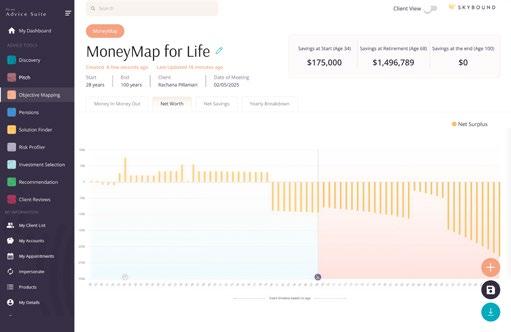
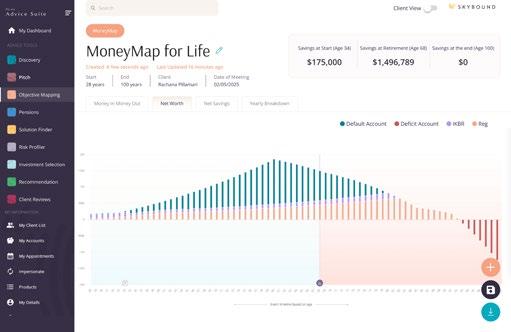
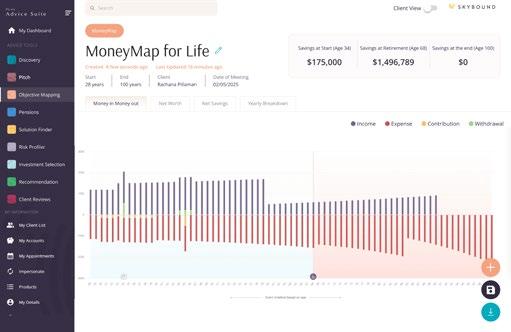
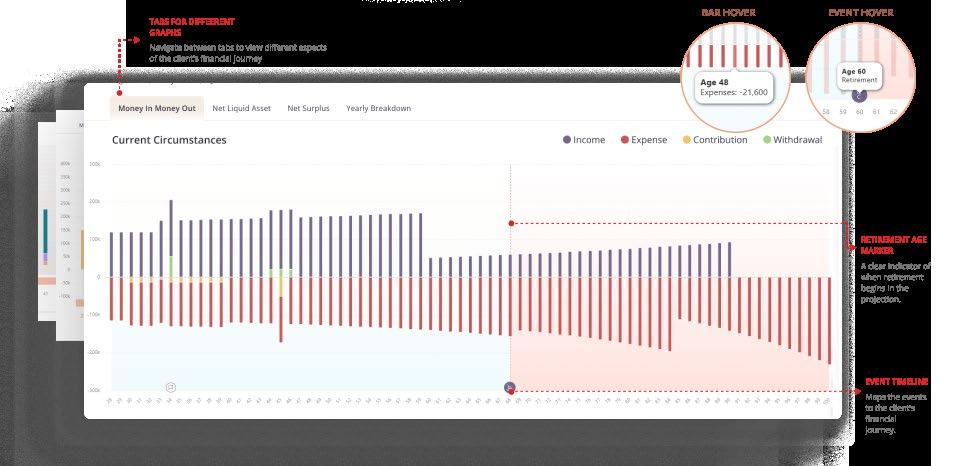
MoneyMap is part of Skybound Wealth’s wider commitment to delivering technology that empowers advisers, improves client outcomes, and sets a new benchmark for the industry. For our advisers, it’s more than a tool - it transforms conversations. Instead of static charts and abstract projections, they can now adjust scenarios live, show the impact of choices visually, and guide clients through decisions with greater clarity and confidence.
This creates deeper trust, stronger engagement, and better long-term outcomes. It also reflects the evolution of our advisory model: planning that is dynamic, collaborative, and aligned with how people live today.
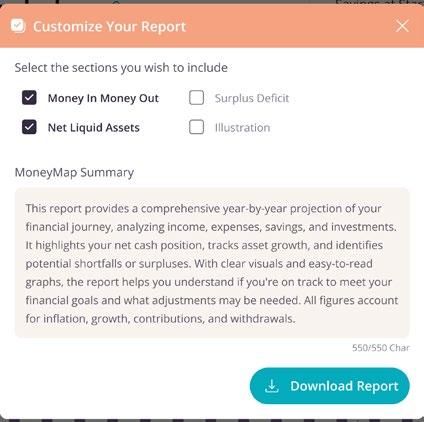
At Skybound, our philosophy is simple: we show up - for our clients, our advisers, and the industry. MoneyMap is proof of that commitment, combining human expertise with the best technology in the market to redefine what international financial planning can be.
The future isn’t something to guess at. With the right guidance and the right tools, you can see it clearly - and plan for it with confidence. MoneyMap is live. And it’s ready to help you take control of tomorrow.
Book a consultation with a Skybound adviser today to explore your financial future with the support of award-winning technology and worldclass expertise.

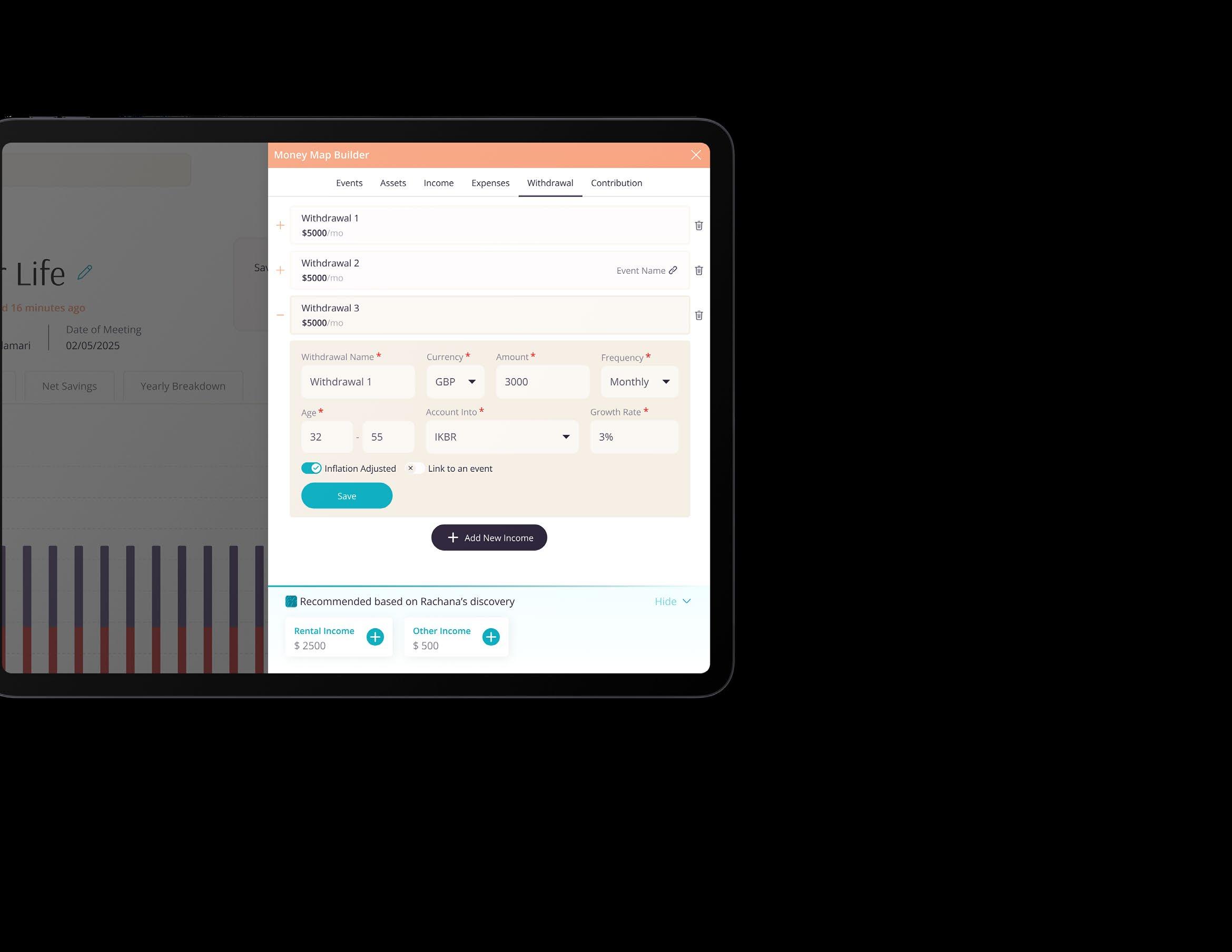
IT’S TIME THE TOOLS DID TOO.
MoneyMap isn’t an add-on or a bolt-on, it’s a custom built rethink of how advisers and clients work together.
• Real-time modelling.
• Multi-currency planning.
• Tax overlays.
• Seamlessly integrated tech.
This is the standard Skybound Wealth is setting.



Written by Mike Coady Chief Executive Officer
The global wealth map is shifting. For decades, conversations around money have revolved around established dynasties, long-standing family offices, and entrepreneurs who spent a lifetime building their fortunes. Today, a new generation is rewriting that script. Gen Z millionaires and billionaires, many of whom are barely into adulthood, are emerging as a fast-growing force shaping markets, consumer culture, and investment flows.
This isn’t just a story of Silicon Valley prodigies or Western trust fund heirs. The trend is global, and nowhere is it more visible than in the Gulf. Dubai, Abu Dhabi, and Riyadh have transformed into accelerators of young wealth. But as I highlighted in a recent contribution to Arabian Business, headlines often oversimplify the narrative. To truly understand this generational shift, we need to look at the sources of this money, the structures supporting it, the fragility it carries, and what it means for the future of wealth.
When people hear the phrase “Gen Z millionaire,” they often picture a self-made tech founder who struck gold overnight. The reality is more nuanced.
On one side are the first-generation builders: digital entrepreneurs, content creators, e-commerce innovators, and tech disruptors. These individuals have harnessed the scalability of digital platforms and the reach of global markets, building businesses in industries that barely existed fifteen years ago. For them, wealth has been created through speed, agility, and a relentless ability to adapt.
On the other side are the high-income heirs: young beneficiaries of established family businesses and dynasties, especially prevalent in the GCC. Their wealth may not have been “earned” in the traditional sense, but it is very much active - capital is being deployed, businesses are being reinvented, and opportunities are being seized with the backing of family reputations and resources.
Both groups carry the title of millionaire. Yet their financial realities diverge: one is climbing the hill of innovation, while the other is protecting inherited ground. Both face challenges - one must learn to preserve, the other must prove the ability to grow beyond the shadow of legacy.
The speed of wealth creation has changed beyond recognition. Three forces stand out.
Technology as an equaliser.
With a smartphone, anyone can reach customers, markets, and investors worldwide. Starting a business no longer requires vast infrastructure or physical presence; scalability is built into the digital model. That’s why we see teenagers running sevenfigure businesses from their bedrooms.
Borderless capital.
Crowdfunding, angel networks, and global venture firms have torn down the walls that once limited entrepreneurs to places like Silicon Valley. Capital is now mobile and opportunistic, flowing into Lagos as easily as London.
The GCC advantage.
Nowhere is this accelerator effect more visible than in the Gulf. Zero personal income tax, state-backed growth agendas like Vision 2030, and abundant pools of private capital create an environment where young wealth can scale at a speed unmatched in traditional Western markets.
A founder in Dubai doesn’t just have access to capital; they have access to a policy framework designed to encourage ambition and reward risk.


Globally, most billionaires under 30 inherited their wealth. Millionaires are a more mixed picture. Yet in the GCC, even those who appear “self-made” often start with family support - be it initial seed capital, introductions, or supply chain access. This doesn’t diminish the achievement, but it does mean the starting line is very different depending on where you stand.
Social media blurs these distinctions. On Instagram, the heir spending dividends on luxury looks no different to the entrepreneur reinvesting every dirham into their start-up. But financially, they are worlds apart. One group are “income millionaires” - living lavishly on high earnings or family support but without building an enduring asset base. The other are “balance sheet millionaires” - structuring, diversifying, and accumulating businesses and investments that can withstand downturns. Only the latter will remain wealthy when the market cycle turns.
“A decade ago, most stories of young wealth began in the US or Western Europe. That dominance is gone.
The industries fuelling this new generation of wealth are split between the “new” and the “traditional.”
The new industries - crypto, gaming, the creator economy, AI ventures - are delivering some of the fastest fortunes in history. Yet in the GCC, enduring wealth still flows from traditional strongholds: real estate, energy, logistics, and large-scale infrastructure.
What’s most interesting is how Gen Z founders are fusing these two worlds. AI-driven real estate platforms, blockchain-enabled logistics, and digitalfirst reinventions of family conglomerates show that it isn’t a question of choosing one over the other. The real success stories are hybrids, blending old and new into something uniquely sustainable.

“This isn’t just a story of Silicon Valley prodigies or Western trust fund heirs. The trend is global, and nowhere is it more visible than in the Gulf.”
A decade ago, most stories of young wealth began in the US or Western Europe. That dominance is gone.
Dubai and Riyadh have emerged as global players, producing young founders and attracting international ones. Singapore has carved out its niche in fintech and cross-border commerce. Lagos has become a hub of digital entrepreneurship and payments innovation.
India’s tech unicorns, SaaS giants, and e-commerce platforms are redefining scale.
The GCC in particular is no longer a satellite to Western markets - it’s a permanent fixture in the global wealth conversation. And with every passing year, its role grows more central.
But let’s not confuse speed with stability. Fast money can vanish just as quickly as it arrives, a point I also raised in our earlier piece, where we looked at how quickly fortunes can shift without proper structures in place. A single market cycle can wipe out a crypto fortune, over-leverage in property can erase years of gains, and liquidity freezes can expose just how brittle some of these new empires really are. The young millionaires who will endure are those who learn early that wealth which isn’t structured is wealth at risk. The difference between an “income millionaire” and a “balance sheet millionaire” is exactly this: one spends, the other builds. This is why guidance matters more than ever. Fragile wealth doesn’t need cheerleaders; it needs frameworks, discipline, and professional support that turns liquidity into resilience. Left unchecked, many of these new fortunes will disappear as quickly as they appeared. With the right structures in place, they can become new dynasties.


What sets the GCC apart is the cultural dimension of wealth. Here, money is rarely viewed as purely individual - it is bound to family reputation, legacy, and dynasty-building. That creates unique pressures. Short-term spenders risk burning through capital and reputation alike. Long-term planners, however, are laying the foundations of dynasties that will shape not only their family’s future but also the economic fabric of the region.
In this part of the world, wealth is not just about lifestyle. It is about stewardship, responsibility, and the obligation to pass something stronger to the next generation.
For those of us advising this new generation, the rise of Gen Z wealth is not just a demographic shift - it’s a complete transformation in expectations. They are digital-first, mobile-native, and globally connected. They expect clarity in real time, advice that travels across borders as easily as they do, and strategies that can flex as fast as the industries they are building in.
At Skybound Wealth, this is exactly where we’ve placed our focus. Technology sits at the centre of our proposition, not as a gimmick, but as a way of giving clients the immediacy and transparency they demand. Our multi-jurisdictional footprint means we can structure and protect wealth wherever it moves, across London, Dubai, Singapore, Riyadh, or beyond. And we combine that reach with the human edge - advisers who can guide fragile, fast-growing wealth with foresight, context, and discipline.
Wealth management for Gen Z isn’t about selling products; it’s about building ecosystems of resilience. And that is where the future lies.
The story of Gen Z wealth is not about overnight success - it’s about the convergence of opportunity, technology, and global capital flows. But it is also a story of fragility.
The names that will still be on the list in 20 years won’t be the ones chasing the loudest headlines or the riskiest bets. They’ll be the ones quietly diversifying, protecting, and building with a generational mindset.
In the GCC, the wealth being created today isn’t just reshaping bank accounts. It is reshaping families, economies, and legacies. And that is the real story worth paying attention to.


Written by Fiona Neill Private Wealth Partner
They say ‘time is money’, and nowhere is that clearer than when it comes to investing. Yet millions of people still leave large sums of cash sitting in bank accounts. It feels safe, but “safe” can come at a hidden price: lost growth. Every year you wait, inflation eats away at your money’s real value and you miss out on the opportunity to grow your wealth through the compounding of returns.
“We’re investing in the right people, in the right places, for the right reasons.”

Whilst it’s no longer front page news, interest rates have fallen back, and inflation is steadily chipping away at what your money can buy. Keeping your money in the bank might feel secure, but over the long term it risks shrinking in real terms. That old advice of “leave it in the bank, it’s safe there” no longer holds true. Safety now comes with a different cost, the opportunity you’re giving up by not investing.
This isn’t about avoiding cash altogether. Everyone needs a buffer for emergencies and short-term spending. The key is not leaving too much sitting idle, just as you wouldn’t put everything into the stock market or a single high-risk investment. Balance is what matters.
Imagine two people each starting with £100,000.
• One leaves it in a bank account.
• The other spreads it across a stocks and shares ISA, a mix of bonds, and pension contributions. After 20 years, the cash saver may only see a modest increase once inflation is factored in.
The investor has the potential for higher growth, though returns are not guaranteed and the value of investments can go down as well as up.
The example illustrates possible outcomes, but actual results will depend on market performance and individual choices.
So why do so many people keep their money parked in cash when the evidence shows it loses value over time? For most, it isn’t about logic, it’s about behaviour. We tell ourselves we’ll invest “when the time is right,” or we convince ourselves the risks outweigh the rewards. In reality, the hesitation usually comes down to three things:
• Fear of risk - the idea that the stock market is dangerous.
• Procrastination - putting it off until “next year.”
• Habit - a belief that banks are the safest place for savings.
The reality is that doing nothing is often the riskiest choice. By standing still, your money loses the chance to grow.
Many people have money scattered across old ISAs, forgotten savings accounts, and pensions they haven’t looked at in years. Left on autopilot, these funds often sit in cautious, low-return investments. Bringing them together into a clear, modern structure, whether through ISAs, bonds, or a flexible pension plan, gives you control and clarity and the chance to align everything with your goals.
The alternative to letting your money sit idle is putting it to work in a way that balances growth and security. That usually means three things: Make use of tax breaks
Everyone knows about ISAs, but there are countless other allowances and reliefs available. Some will be right for you, others won’t. A financial adviser can help identify which apply to your situation and how to use them to make your money work harder without unnecessary risk.
Build a diversified portfolio
A healthy mix of investments spreads risk and creates resilience. For example, property can provide long-term capital growth and rental income, while fixed income such as bonds can offer stability and predictable returns. Equities, on the other hand, drive growth over time. The right blend depends on your goals and attitude to risk, but a portfolio that combines different assets is usually stronger than one leaning on a single option. Keep it under review
Markets change, and life moves on, so should your portfolio. Leaving investments on autopilot is little better than leaving cash in the bank. Regular reviews and active management ensure your money continues to work in line with your objectives and your appetite for risk.
The earlier you start investing, the more choice you have. In your twenties and thirties, you can afford to focus on growth. In your forties and fifties, balance becomes more important. Leave it until your sixties, and options narrow with the focus shifting to capital protection. Waiting limits your choices, while acting earlier opens them up.
Across the UK, there’s already a savings gap, with many people underestimating how much they’ll need in retirement. Leaving money in cash or default funds risks falling short of the lifestyle you expect later in life. The sooner you review and act, the stronger your position will be.
An adviser can help you decide how much to keep in cash as a buffer, where to invest for growth, and how to bring scattered pots together so they work harder. The best time to take control was yesterday. The next best time is today.

Disclosure
Skybound Wealth UK is a Trading Style of Skybound Wealth Management Limited who are authorised and regulated by the Financial Conduct Authority.
While investing offers the potential for higher growth over time, it also carries risk, and the value of investments can fall as well as rise.
With nearly 75% of advisers retiring in the next decade, the Academy by Skybound Wealth is preparing the leaders of tomorrow.
Caring for our Shared Future
Through first-class training and mentorship, the Academy by Skybound Wealth ensures clients receive exceptional advice and service, today and in the years to come.

Scan the QR code or click here to find out more about our Academy.



Written by Carla Smart Group Head of Pensions & Chartered Financial Planner

With an estimated £50 billion in missing pension pots, the UK Government has been working on the Pensions Dashboard for almost a decade. This online platform, under development by the Money & Pensions Service (MaPS), has faced several delays but has recently made significant progress. Now, it’s gaining momentum, with key pension providers already on board and plans for public access by late 2025 or early 2026.
Once live, you'll be able to log in, enter a few personal details (including your National Insurance number, optional but helpful), and instantly see a consolidated view of all your pensions. The aim is simple: to help you track your pension pots, reduce the number of lost pensions, and give you greater control over your retirement planning.
The Pension Dashboard is moving forward quickly. Many major private-sector pension providers, including LV=, Moneybox, Standard Life, and Fidelity, have already connected their systems, meaning their data is now available through the platform. The State Pension is now fully integrated, so you’ll be able to see your State Pension data alongside your private and workplace pensions, creating a much clearer financial picture for you.
Integrating the State Pension into the Pension Dashboard means you’ll no longer have to track your State Pension separately. Instead of piecing together fragmented information from various sources, you'll get a unified view of all your retirement savings, both public and private. The system will automatically link your State Pension data, so there’s no need to manually enter your National Insurance number or hunt down separate records. This makes the process faster and more efficient, helping you clearly see how the State Pension fits into your wider retirement plan. This integration not only simplifies the process but also fosters greater engagement and confidence, helping you feel more secure about your retirement savings.
“Instead of piecing together fragmented information from various sources, you'll get a unified view of all your retirement savings, both public and private.”
The Pensions Dashboard is designed to be an invaluable tool for savers like you. Here’s how it can benefit you:
Clearer Overview of Your Retirement:
You’ll get a full view of all your pensions, State Pension and private/workplace pensions, making it easier to identify lost pension pots and take action early to improve your retirement outlook.
Easy Access to Information:
Real-time data will keep you on top of your pensions. You won’t have to search through paperwork or contact providers to track down details, everything will be available in one place.
Better Engagement and Confidence:
With more providers connecting to the platform, you’ll have immediate access to up-to-date information, giving you confidence in the decisions you make regarding your retirement planning.
The dashboard has been a long time coming, with several delays since it was first introduced. However, progress has been made, and the platform is now moving forward, with key pension providers already on board. Public access isn’t available yet, but consumer testing is expected to begin this summer, with the wider rollout expected in late 2025 or early 2026.
Now is the time to start preparing your pensions and take advantage of this new system. It’s an easy, effective way to get a complete view of your retirement savings and take control of your financial future.
Although the full system isn’t available yet, you can get ahead by reviewing your pension accounts now. If you haven’t done so already, ensure your pension providers have your National Insurance details so they’re ready when the dashboard becomes available.
When the dashboard goes live, you’ll be able to access all your pension information in one place. Stay tuned for updates on how to make the most of this new tool as it becomes available.
The Pension Dashboard is a game-changer. It shifts the process from fragmented, hard-to-access pension data to a unified, user-friendly experience. With the State Pension now fully integrated, it’s becoming a truly comprehensive platform for managing your pensions, unlocking tangible benefits for savers like you. And when you combine this newfound visibility with the support of your financial adviser, it could be the key to unlocking a more secure, well-planned retirement.

“Now is the time to start preparing your pensions and take advantage of this new system.”
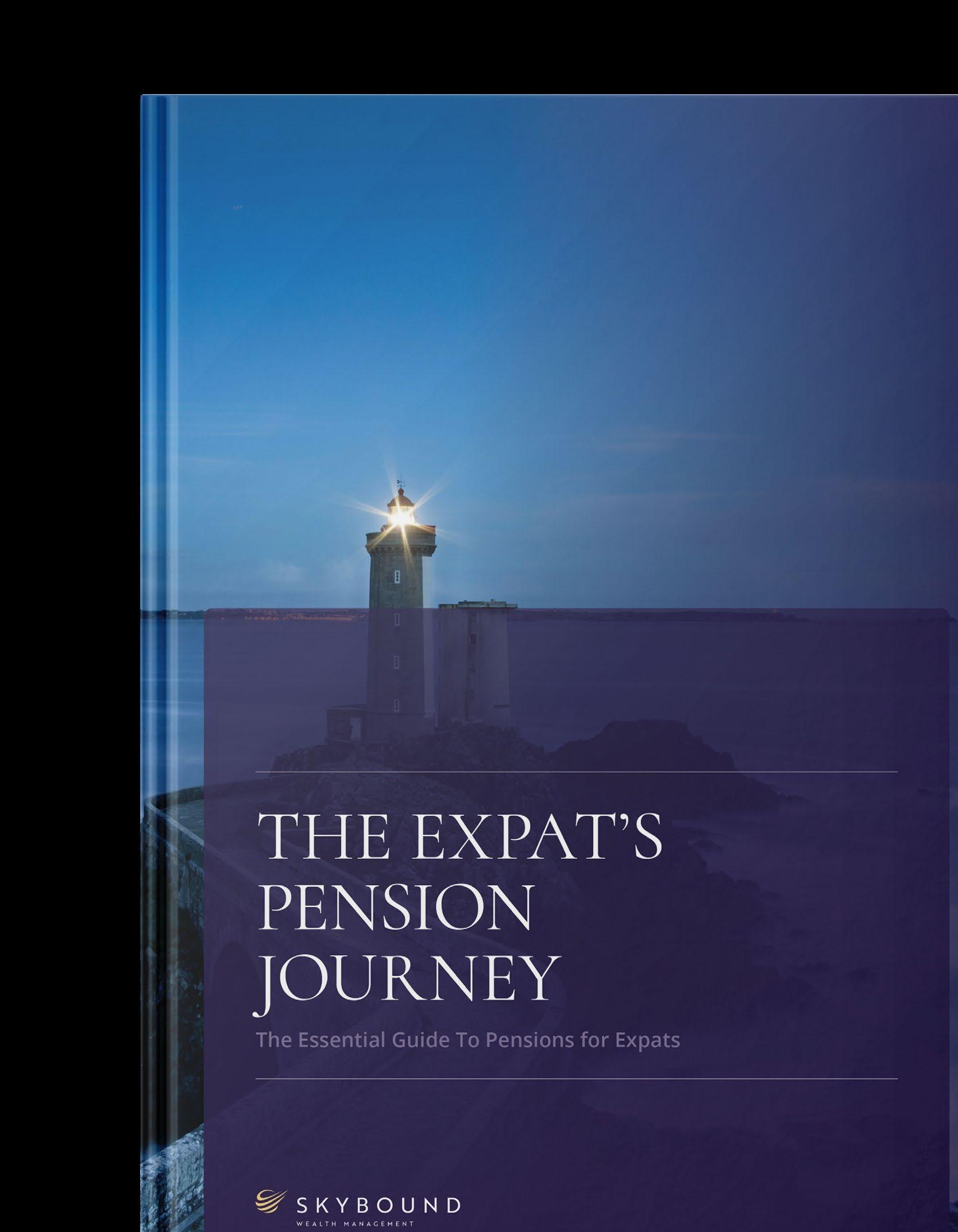

Written by Will Spires Private Wealth Adviser
Starting April 2027, one of the last major shelters from UK inheritance tax disappears: pensions. Funds that could previously be passed down largely tax-free will now be pulled squarely into the inheritance tax net. For British expatriates, this isn’t just a technical adjustmentit’s a seismic change that could see 40% of pension wealth lost to HMRC instead of your family. Acting early is critical. With the right planning, expats still have time to protect their estates and preserve wealth for future generations. Waiting until the deadline approaches, however, may leave families facing limited options and significant tax bills.
At present, if you die before the age of 75, UK defined contribution pensions can pass to your chosen beneficiaries without triggering income or inheritance tax. After 75, only income tax typically applies on withdrawals, and inheritance tax does not. This has quietly allowed many individuals to use pensions as a highly effective tool for intergenerational wealth transfer.
From 6 April 2027, however, all unused pension funds will be included in your estate for inheritance tax purposes, regardless of age at death. Estates exceeding the combined nil-rate bands, currently £325,000 for the general allowance plus £175,000 for the residence nil-rate band, may face the standard 40% inheritance tax.
Spouses and civil partners still benefit from exemptions, but children, grandchildren, and other non-spousal beneficiaries could face substantial bills. On top of this, income tax may still apply when they draw from the inherited pension, creating a double tax exposure.
Many expats assume that living outside the UK shields them from inheritance tax. That assumption is becoming outdated.
The UK’s residence-based inheritance tax regime, introduced in April 2025, considers your residency over the last 20 years. If you have been a UK tax resident for 10 out of the last 20 years, your worldwide estate, including pensions, remains subject to UK inheritance tax.
For example, a British expatriate who moved to the UAE in 2017 and plans to stay until 2026 would still fall within the rules in 2027. Even short periods back in the UK can reset the clock, bringing your estate back within HMRC’s reach.


Consider Sarah, a 69-year-old living in Dubai with a £900,000 SIPP. She assumes her estate is outside the UK tax net, but under the 10/20 rule, her children could face an inheritance tax bill of approximately £230,000, before paying income tax on withdrawals.
Or James, 63, who has lived overseas for 17 years but plans to return to the UK. His £700,000 pension, combined with property and other savings, could see a combined estate tax exposure exceeding £300,000.
These situations are not hypothetical. Many British expats in the Gulf believe they are protected, when in fact, their estates are fully exposed.
This isn’t a call for panic, but it is a call to act. From 2027, pensions shift from being one of the most effective tools for passing wealth tax-free to a potential liability. The sooner you plan, the more options you have to protect your estate and preserve your legacy. Leaving it late often means fewer choices and a heavier tax burden for your family.
Now is the time to look carefully at how your pension fits into your broader estate planning. That means reviewing your estate plan and understanding how the new rules could affect the size of your taxable estate. For some, it may make sense to start accessing pension wealth earlier, or reallocating funds to reduce exposure. For others, updating wills and beneficiary nominations will be essential to make sure their intentions are carried out effectively. Families whose wealth is tied up in pensions or property should also think about how any tax bill will be paid in practice, whether through cash reserves or life cover. And for British expats, seeking advice on residency and cross-border pension structures is increasingly important, since living abroad no longer guarantees protection from UK inheritance tax.
“Acting early is critical. With the right planning, expats still have time to protect their estates and preserve wealth for future generations.”
From April 2027, pensions will no longer be immune to inheritance tax. For British expatriates in the UAE, the planning window is closing, but it has not closed entirely. Acting now can significantly reduce the risk to your estate and maximise the wealth passed to your family.
Let’s Talk While Time Is Still on Your Side
As a Chartered Financial Planner living and working in the UAE, I specialise in helping British expatriates manage the intersection of UK rules and expat realities. If you have a UK pension and want to ensure your wealth reaches your family, book a confidential, no-obligation review today. Together, we can assess your residency, pension structures, and legacy goals, and create a strategy that is both compliant and effective.
Book a confidential, no-obligation review with Will Spires today.

“Spouses and civil partners still benefit from exemptions, but children, grandchildren, and other non-spousal beneficiaries could face substantial bills. On top of this, income tax may still apply when they draw from the inherited pension, creating a double tax exposure.”

Unlock the full potential of your wealth with tailored strategies for expats.

Scan the QR code or click here to find out more.
Or contact your Skybound Wealth Financial Adviser today for more information.

Renting Out UK Property as a Spanish Tax Resident:

Written by Andy Buchanan Area Manager & Private Wealth Adviser
Owning rental property in the UK has long been an attractive investment due to the strong legal framework, high demand for housing, and potential for capital growth. However, when you move to Spain while continuing to rent out a property in the UK, the tax implications become more complicated.
If you’re already living in Spain or planning to relocate, it’s essential to understand your tax obligations. This guide explains what you need to declare, what you can deduct, and whether maintaining your UK property is still a smart choice under Spain’s tax regime.
To begin, it's crucial to know if you are considered a Spanish tax resident. If you spend more than 183 days in Spain or your primary economic interests are located there, you are deemed a Spanish tax resident. As such, Spain will tax your worldwide income, including rental income from UK property. Even if you maintain UK citizenship, once you become a tax resident in Spain, you must follow Spanish tax laws for all of your global assets.
Renting out a UK property while residing in Spain requires careful tax planning. For longterm lettings, you must declare the gross rental income on your Spanish personal income tax return. Spain uses a progressive tax scale ranging from 19% to 47%, depending on your total worldwide income.
If you’re letting the property long-term, you could benefit from a 60% reduction on your net rental income, provided the rental contract exceeds 12 months. However, it’s essential to bear in mind that Spain has strict rules for deducting expenses. You can deduct costs such as mortgage interest, local council tax, UK property taxes, building insurance, property management fees, agency letting fees, maintenance and repairs (excluding improvements), utility bills (if paid by you), and depreciation on the building and furniture.
The key requirement is proper documentation. To claim these deductions, you must have official invoices (or facturas) in Spanish-compliant format. Without valid invoices, you cannot claim the deductions, no matter how legitimate the expense may seem.
“Spain does not have a universal inheritance tax threshold, meaning that your UK property could be subject to regional Spanish succession taxes, especially if passed on to non-immediate family members.”
Although you are now a tax resident in Spain, your obligations to the UK tax system remain. As a non-resident landlord, you are still required to pay UK income tax on rental profits, typically at a rate of 20%. However, the UK and Spain have a Double Taxation Agreement (DTA) in place, which means that the tax you pay in the UK can be offset against your Spanish tax liability, but only to a certain extent.
You’ll need to file a UK Self-Assessment tax return each year, reporting your rental income from the UK property. Simultaneously, the same income must be reported on your Spanish tax return. Additionally, you will need to apply for tax credit relief in Spain for the UK tax you’ve paid. This relief is not automatically granted, so you must ensure it’s properly claimed.
Alongside income tax, there are a few additional factors to consider when renting out UK property while living in Spain. Since your rental income is earned in GBP but taxed in EUR, fluctuations in exchange rates can affect your returns. Currency risk is something to consider, as the timing of conversion can materially impact your financial outcomes.
If you decide to sell your UK property while residing in Spain, you may owe Capital Gains Tax (CGT) in both the UK and Spain. The UK tax rate on capital gains ranges from 18% to 28%, while in Spain, it ranges from 19% to 28%. However, Spain will provide a credit for the UK tax paid, which can help reduce your overall liability. Keep in mind that Spanish residents don’t benefit from the UK’s Private Residence Relief (PRR) unless the property was your main home while you were a UK resident.
Another important consideration is inheritance tax in Spain. Spain does not have a universal inheritance tax threshold, meaning that your UK property could be subject to regional Spanish succession taxes, especially if passed on to non-immediate family members. Furthermore, all global assets, including UK property, must be declared each year using Spain’s Modelo 720 form. Failure to comply with this declaration can result in severe penalties.
Owning UK property while living in Spain may seem appealing at first, but the reality often proves more complex. The additional administrative requirements, tracking invoices, filing dual tax returns, dealing with currency risk, and possibly hiring both UK and Spanish tax advisers, can significantly reduce your net rental yield. Add in property management costs and the travel expenses for inspections, and the returns may not be as favourable as expected.
For many expats, especially retirees or those seeking a simpler lifestyle in Spain, the complexities of managing a UK property may outweigh the benefits. If your primary goal is to enjoy a hassle-free life in Spain, you may want to reconsider whether holding onto your UK property still aligns with your financial objectives.

If your UK rental property has appreciated significantly, now might be the time to explore alternative investment options. Many former landlords are choosing globally diversified investment portfolios that offer tax-efficient structures. These portfolios help spread your investments across different markets, reducing your exposure to any one asset.
Other alternatives include Spanish-compliant investment bonds or life assurance-linked savings plans. These options offer lower tax burdens, minimal administrative hassle, and better alignment with long-term retirement goals. By holding wealth in these structures, you can avoid the complexities of managing rental properties abroad and better position your investments for the future.
Owning UK property as a Spanish tax resident can be a solid investment, but the tax and administrative complexities may make it less attractive. Whether you choose to sell or keep your UK property, it's crucial to structure your assets in a way that works for your life in Spain. Our cross-border wealth experts can help you navigate these complexities and guide you in making the best decisions for your financial future.
Managing a UK mortgage while living abroad can be tricky. Claim your free mortgage review to make sure you're getting the best possible rate.
Why Book a Free Review?
Expert Advice: Our UK-qualified, UK-based advisers are here to provide tailored support.
Stay Ahead of Changing Rates: Mortgage rates can change, and it’s important to stay updated to ensure you’re not paying more than necessary.
International Flexibility: We understand the unique situation of international clients like you and can help with specific considerations.
Booking your free review is easy –simply click the link below to choose a time that works best for you:

Scan the QR code or click here to book your free review.
Or contact your Skybound Wealth Financial Adviser today.

Written by Christopher Bowler Private Wealth Partner
Leaving South Africa is more than changing your address. For many South Africans, it also means making decisions about tax and financial status that can shape the rest of their lives.
I’ve worked with hundreds of clients through this, and the two terms that cause the most confusion are Tax Emigration and Financial Emigration.
They sound similar, but they are not the same thing. Understanding the difference is critical if you want to protect your wealth, reduce tax exposure, and ensure you are compliant with the South African Revenue Service (SARS) and the Reserve Bank.
Tax Emigration is about officially changing your tax status with SARS. In simple terms, it stops you from being taxed on your worldwide income and limits South African tax to what you still earn within the country.
Why would you do it? Because once you’ve left permanently and built your life abroad, you don’t want SARS taxing your global income. There is also the so-called “expat tax” which can bite if you don’t structure things correctly.
How Tax Emigration works:
• You apply to SARS for a Non-Resident Tax Certificate.
• To qualify, you need to show you are genuinely living abroad, meeting tests like spending fewer than 183 days in South Africa in a year and proving your main interests and family life are outside the country.
• Once SARS accepts your application, you are treated as a non-resident for tax. That means no reporting of global income, no worldwide tax liability, and fewer compliance headaches.

With Tax Emigration, you only pay South African tax on income sourced within the country, such as rental income. Your tax affairs abroad become simpler and clearer, and you gain protection against double taxation.
Costs and risks:
Professional help can range from R5,000 to R25,000 depending on complexity. If you don’t meet the criteria, SARS will not approve the application, and poor planning can leave you facing double taxation.

“Every client I work with has a unique set of circumstances, and there’s no single answer that fits everyone. Some South Africans living abroad only need Tax Emigration. Others need both. ”

Financial Emigration is different. This is about your status with the South African Reserve Bank (SARB), not SARS. It’s the formal process of saying, “I have left South Africa for good,” which then allows you to move larger sums of money and assets out of the country.
What Financial Emigration involves:
Financial Emigration starts with securing tax clearance from SARS, followed by submitting the required documents through your bank or an authorised dealer. Once reviewed, the South African Reserve Bank grants approval that recognises you as a financial non-resident.
Why consider it?
It allows you to transfer significant assets abroad, currently up to R22 million a year. Estate planning also becomes simpler, with assets managed outside South Africa’s estate duties and succession rules. Above all, it provides certainty when moving investments, pensions, and property proceeds overseas.
Practicalities:
Expect fees ranging from a few thousand rand in bank costs to tens of thousands if you use lawyers or specialists. You also need to prove you’ve been a tax non-resident for at least three years and that your SARS account is fully settled.
This is the question I get asked most often. The truth is, many South Africans abroad will go through both processes at different stages.
Tax Emigration usually comes first, as it deals directly with SARS and your ongoing liability. Once you are established overseas, Financial Emigration can follow if you need to transfer larger amounts or restructure your estate planning.
Think of it this way: Tax Emigration means changing your tax residency so that SARS no longer taxes your worldwide income. Financial Emigration, on the other hand, is about changing your financial residency so the South African Reserve Bank allows you to move assets more freely.
“Leaving South Africa is more than changing your address. For many South Africans, it also means making decisions about tax and financial status that can shape the rest of their lives.”
Aspect Financial Emigration
Purpose
Recognition
Impact
Asset Transfer
Complexity
Cost
Timing
Deregister from South Africa's fincancial system (SARB)
South African Reserve Bank
Enables transfer of assets abroad, simplifies estate planning
Tax Emigration
Change tax residency status (SARS)
South African Revenue Service
Stops worldwide income being taxed by SARS
Allows up to R22m annually (with conditions) No direct asset transfer benefit
More paperwork, involves banks and SARB Simpler, mainly tax-focused
Bank/Legal fees, often higher if specialists involved
Often done after you've settled abroad
Every client I work with has a unique set of circumstances, and there’s no single answer that fits everyone. Some South Africans living abroad only need Tax Emigration. Others need both. The important part is that you understand the difference and act at the right time.
Handled correctly, these processes can save you money, simplify your estate planning, and give you clarity about where you stand with SARS and SARB. Handled badly, they can create years of unnecessary tax bills and administrative headaches.
If you’re living abroad and unsure where you stand, get professional guidance before you make any big decisions. It’s always easier to do this early rather than try to fix problems later.
Professional fees, generally lower upfront
Usually first step when leaving permanently

Since 2003, GC Partners have been helping private & corporate clients with their foreign currency and money transfer needs.
Established In 2003 Competitive FX Rates $20bn Transacted, Per Annum



Here’s

Written by Guy Hilton Private Wealth Adviser
Returning to the UK after life abroad can feel like a fresh chapter: a new job, old friends, family close by. But if you get the timing wrong, HMRC might greet you with something unexpected, a tax bill on income you thought was safe.
Many returning expats are caught off guard. They assume UK tax starts the moment they step back onto British soil. Unfortunately, it doesn’t work that way. Without proper planning, the UK can tax income you earned while still living overseas, just because of when (and how) you returned.
Guy Hilton, Chartered Financial Planner at Skybound Wealth Management, breaks down how to move back smartly and keep your pre-return wealth out of the UK tax net.


The UK tax year runs from 6 April to 5 April. If you move back partway through the year and don’t qualify for special treatment, you could be deemed UK tax resident for the entire year, even if you were only back for a few months.
That can mean:
• Salary you earned abroad suddenly becomes taxable
• Dividends, bonuses, or capital gains fall into HMRC’s scope
• Withdrawals from offshore investments could face UK tax
It feels unfair. But it’s avoidable, if you plan properly.
Split Year Treatment (SYT) divides the UK tax year into two periods: one before you return, when you are considered a non-resident, and one after your arrival, when you become a UK resident. If you qualify for SYT, only the income earned after you become a UK resident is subject to taxation. Any income, gains, or pension withdrawals from your non-resident period remain exempt from UK tax.
However, SYT isn't automatic. To qualify, you must meet one of HMRC’s conditions, such as moving back permanently, starting full-time employment in the UK, returning with your family, or ending full-time work abroad. You'll also need to claim SYT in your Self-Assessment and provide evidence that you meet the necessary criteria.
While moving back before 6 April can work, it adds complexity if you don’t qualify for SYT. That’s why many expats choose to return after 6 April, so they start cleanly in a new tax year, reducing the chance of accidental residency and retroactive taxation.
The earlier you plan your move, the more flexibility you have.
1. Wrap Up Overseas Income Early
If you're planning to sell property or investments, take a large bonus or payout, or draw from an offshore pension or savings plan, aim to complete these actions before you trigger UK residency. Once you return, even income from abroad can be subject to UK tax.
2. Review Offshore Investments and Pensions
You might currently hold offshore bonds or funds, regular savings plans, non-UK bank accounts, or UK pensions you’ve left untouched. Ask yourself whether these will still be efficient once you become a UK resident. Would it make sense to restructure, withdraw, or consolidate them before you return?
For example, under current rules, non-residents may be able to withdraw their entire pension pot tax-free, but once you become a UK resident again, that option disappears quickly. Getting this right could mean the difference between making efficient withdrawals and facing unnecessary tax.
3. Don’t Accidentally Trigger UK Residency Early
Just because you “move back” on a certain date doesn’t mean HMRC agrees. Under the Statutory Residence Test (SRT), you might already be classed as UK-resident if you:
• Spent too many days in the UK recently
• Have a spouse or child already living there
• Maintain a UK property or work contract
• Visited frequently for business or family reasons
We’ve seen clients unknowingly trigger residency months before they thought they had. That’s why it pays to review your travel calendar and personal ties well in advance.
“Many returning expats are caught off guard. They assume UK tax starts the moment they step back onto British soil. Unfortunately, it doesn’t work that way.”
Come Back on Your Terms - Not HMRC’s
Returning home can be emotional, exciting, and sometimes overwhelming. However, one misstep could undo years of careful financial planning abroad. With the right strategy, you can minimise or eliminate UK tax on income earned overseas, protect and restructure your offshore savings, and plan your pension access wisely. It’s also important to avoid HMRC penalties and reduce paperwork headaches, ensuring you set yourself up for financial confidence in your new chapter in the UK.
If you’re thinking of returning to the UK, don’t leave it to chance. Plan ahead.
Book a confidential planning session and get tailored advice on how to structure your return; tax-smart, smooth, and fully in control.

Returning to the UK is more than just a change of address. It’s a financial event with far-reaching implications, from tax rules to pension planning, investment structure, and more. But don’t worry, we’re here to guide you through it.
Download Our Essential Guide To Ensure You’re Financially Prepared And Positioned For Success.


Q3 2025 Review & Q4 2025 Outlook

Written by Jabir Sardharwalla Chief Investment Strategist
Markets were on fire again over Q3. Look at the table below – equiities, bonds (corporate) and commodities (except oil) delivered strong gains. I did a quick comparison of YTD Q2 vs YTD Q3 – the MSCI World and MSCI EM almost doubled their YTD gains!
* Refers to the change in the yield
Several factors have helped drive this Q3 performance:
1. The tariff wars have abated and the the overall effective tariff rate levied by the US on the RoW is towards the 15% scale. This makes input price pressures more manageable – between exporters, importers and governments, a substantial amount of these tariffs have been absorbed.
2. In turn, the outcome of the tariff wars has meant upward inflationary pressures have been subdued as is evident across major nations both at nominal and core levels.
3. Interest rate easing has started and seems to be gathering momentum. The US, EU, Canada – have all begun cutting rates providing a boost to equities.
4. Geopolitical fears still persist but appear contained. The two main flashpoints are the Middle East (Israel/Gaza) and Russia/Ukraine. There are also suggestions of a change in tune following President Trump’s UN address in which he seemed to deliver a tougher line against Russia calling it a “Paper Tiger”. He also suggested Ukraine could win all its land back.
The chart below, courtesy of DB, looks at performance both for Q3 and YTD a select group of financial assets (expressed in US$ terms):
“The tariff wars have abated and the the overall effective tariff rate levied by the US on the RoW is towards the 15% scale.”
Source: Deutche Bank, Bloomberg Finance LP


Points to note:
1. Precious Metals: Gold and Silver continued their strong run on the back of the Fed cutting rates. Based on the Fed’s “Dot Plot”, there are more to come – two more this year and one in early 2026. Going forward, given Trump’s attempt to place dovish-leaning Fed members, a more relaxed monetary policy would be even more supportive for precious metals.
2. Equities: There were exceptional gains by the Vitenamese market, Magnificent-7, Shanghai Comp., Jakarta SE, Hang Seng, Nasdaq, Nikkei and S&P 500.
3. Bonds: Despite rate cuts, long bonds struggled in Europe, especially on the back of problems in France where yet another PM resigned. Fitch downgraded France from AA- to A+. the long (30y) bonds saw sharp rises in yields.
4. FX: The US$ saw some stability recovering +0.9% on the quarter (despite seeing its worst 1H performance since 1973).
5. Energy: at the other end of the chart, oil took another beating with WTI and Brent langusihing between the low US$60s and mid US$60s respectively. The world remains oversupplied while demand is still tepid and Russia continues to sell heavily discounted oil.
“Despite rate cuts, long bonds struggled in Europe, especially on the back of problems in France where yet another PM resigned.”
So where to from here?
With markets surging, valuations are rising and looking quite rich. Some Investors are feeling understandably nervous. Meanwhile, there seems to be a growing surge in retail monies chasing the rally – a classic FOMO situation. Look at the charts below:
Both charts show current 12-month forward valuations to be at new highs by both country/ region and sector. IT and Growth are somewhat synonymous and most of the latter is positioned in the US….and the US accounts for some two-thirds of the MSCI World index. So, together, these four groupings are intertwined. However, look outside the US and there is still value in Japan, Asia, EM & Europe (selectively!).
“With
markets surging, valuations are rising and looking quite rich. Some Investors are feeling understandably nervous.”

Factors affecting Q3?
1. Rates: the pressure to cut rates will continue. Latest Fed comments from a newly appointed member argues strongly for lower, neutral rates. The ardent doves believe that is close to 3% and is based on the weakening labour market picture. They argue the Fed is behind the curvenot all Fed members are in agreement!
2. Energy: oil prices don’t have much support. Since Feb. 2022, we been through a few challenges (oil depots being destroyed, supply lines being threatened in the Straits of Hormuz, etc.) and yet oil remains suppressed. Base Case: we stay in a soft market with oil trading between $50 and $60. This will be a downward detractor to inflation (-0.1% to -0.3%) while bond yields settle around 3.8% to 4.00%. Real incomes will remain supported with modest, consumer benefit. What could change this outlook? A geopolitical shock involving severe disruptions and/or a strong rise in demand. This could send oil prices to $80 to $100+ per barrel with a severe impact on inflation and bond yields. The consumer would end up in a tailspin.
3. European politics: France’s recently appointed Prime Minister (Lecornu) has just resigned – he was the fifth PM appointed in two years by Macron. Pressure is growing on Macron to resign as President. To do so would new elections –and this would very likely pave the way for the so-called far-right to swoop in and take the helm at both levels (Presidency and Parliament). It’s a dynamic that would change Europe – and rock the boat in Germany even more.
4. Tech rally: is it overdone? Profitability is highly concentrated! A McKinsey report concluded 95% of GenAI pilots fail to deliver ROI (Return On Investment). It did conclude that in the field of Industrial/Ops tech, companies are achieving 5X ROI in back-office and manufacturing AI. The rally witnessed so far has been mixed – it has been a valid rally in the infra layer (chips, cloud & models) but overhyped in Apps/tools. When it comes to earnings to back up valuations, only some (e.g. Nvidia) are seeing the two rise commensurately – and even here things could change. CAPEX is accelerating sharply with global data centre investment hitting $455bn in 2024 and forecasted to jump another +30% in 2025. The big drivers are the hyperscalers (AWS, Google, Microsoft) who are responsible for a disproportionate share of infrastructure CAPEX - especially in AI-oriented expansion. All this begs the question: when is the breakeven/ payback?? For the Hyperscalers, it is about 4y to 6y, for the Infra startups, about 3y to 5y, for the Model Companies about 5y to 7y and for the Enterprises building private DCs, about 6y to 10y! In the tech space, obsolescence is a massive risk – especially considering major advances happening every 2 years.
For now – and till the end of the year – the rate cutting scenario should provide good impetus to equities while supporting bonds. The goldilocks scenario will continue to fire on. Lower rates will still support precious metals (Gold and Silver). The latter is not just an opportunity cost play – central banks are still buying in considerable amounts. The US has a vast stockpile of gold that it has not revalued in years (based on legislation). Inflation should stay on the sidelines – but the pressure on it will remain to the upside.
Thank you for your continuing support as always – we really value it and please reach out to us if you have any queries.



Written by Taylor Condon Area Manager & Private Wealth Manager
For many Brits, Spain offers the perfect blend of sunshine, lifestyle, and opportunity. But the move brings more than just a change of climate. Spain’s tax system is very different from the UK’s, and too often people only discover the differences when an unexpected bill lands on the doormat. Here are five of the most common traps that catch new residents, and how to prepare for them.
One of the biggest adjustments is that Spain taxes worldwide income once you are considered a resident, typically by spending more than 183 days in the country in a calendar year. That means UK rental income, dividends, pensions, and even overseas bank interest must all be declared. While double taxation relief may help, it still comes as a surprise to many who assume only Spanish income is in scope.
Spain’s special expatriate tax regime, often called Beckham’s Law, can look attractive. It allows qualifying newcomers to pay Spanish tax only on Spanish income for up to six years. The catch is that once it ends, all of your global income and assets fall fully under Spanish tax rules. Without planning, that transition can mean a sudden and steep rise in your annual liabilities.
“Financial products designed for the UK system do not always translate smoothly. ISAs lose their benefits, UK pensions can be taxed differently, and some investments are not recognised under Spanish rules.”
In the UK, ISAs are one of the most popular savings tools, with growth and income sheltered from tax. Spain does not recognise the ISA wrapper, which means once you become tax resident, income and gains inside an ISA are treated just like any other investment. On top of that, non-UK residents cannot make new ISA contributions in most cases. The good news is there are Spanish-compliant investment options that can help replicate some of the tax efficiency.
Unlike the UK, Spain has a wealth tax that can apply once your assets rise above certain thresholds. Rules vary by region, and there is also a national solidarity tax aimed at very high net worth individuals. Both can often be reduced or planned around, but ignoring them can be costly. This is one of the first areas wealthier expats should address.
Financial products designed for the UK system do not always translate smoothly. ISAs lose their benefits, UK pensions can be taxed differently, and some investments are not recognised under Spanish rules. Succession law also complicates matters, as Spain applies forced heirship, meaning part of your estate must be reserved for certain heirs regardless of your UK will. Reviewing your holdings and estate plan before moving ensures they fit the Spanish framework.
Spain offers an incredible lifestyle, but its tax system is fundamentally different from the UK’s. Understanding these differences before you move can save money, reduce stress, and give you more control over your finances.
Planning a move or already here? Seak with Taylor Condon now to review your options and make sure your finances are working for you.

Written by Craig Stokes Managing Director - UK

Last year, just 8.6% of people in the UK sought professional advice on their investments, pensions, or retirement planning, according to the FCA’s latest Financial Lives survey*. That means more than nine out of ten households are trying to manage their money without support, even as one in ten have no savings at all, another 21% have less than £1,000 to fall back on, and a quarter of the population is classed as financially vulnerable.
It paints a clear picture: households living close to the edge while avoiding the very support that could change that.
For many, advice still feels like something “for the wealthy.” Others believe they can manage on their own or put off decisions until later in life. But delaying often means missing the most powerful advantage available: time. The earlier you start, the greater the effect of compounding, disciplined saving, and structured investing.
The FCA survey underlines how misplaced confidence can quietly erode security. More than 60% of people with over £10,000 in investible assets keep most of it in cash. That may feel safe, but over time inflation chips away at its value. Similarly, a third of those with defined contribution pensions have less than £10,000 saved, far from enough for retirement.

Disclosure
* FCA’s Latest Financial Lives Survey Skybound Wealth UK is a Trading Style of Skybound Wealth Management Limited who are authorised and regulated by the Financial Conduct Authority. While investing offers the potential for higher growth over time, it also carries risk, and the value of investments can fall as well as rise.
A financial plan isn’t just about picking funds or chasing returns. It connects every area of your life, investments, pensions, protection, cashflow, and estate planning, into one clear strategy. When everything is aligned, you know where you stand today, how prepared you are for tomorrow, and what adjustments you need to stay on course.
Imagine someone in their 30s juggling everyday expenses, a mortgage, and scattered pensions from past jobs. A structured plan can show how much to save each month, where to invest, and how to protect against unexpected events. Or picture a professional in their 40s who has accumulated savings but kept most of it in cash. A financial plan can model how reallocating to a globally diversified portfolio makes the difference between just getting by in retirement or enjoying the lifestyle they want.
These examples aren’t unusual. They are the everyday results of moving from reacting to planning.
Without a plan, you risk drifting year to year, hoping salary increases or last-minute decisions will be enough. With a plan, you put structure around your goals, protect your family, and give yourself options.
The FCA’s research is clear: those who seek advice feel more in control, less stressed about money, and more resilient when life changes.
If you’re ready to move from reacting to planning, now is the time to take action. Book a free initial planning meeting with us and start building the structure that will shape your future.
“Wealthy expats don’t just earn well, they make their money work for them. By applying these principles, you can turn
your
time in the Middle East into a stepping stone for long-term financial security.”
prodUCt LEad |
sKyBoUnd CLiEnt app
Innovation, collaboration, and curiosity — three qualities that define Zain’s journey at Skybound Wealth.
Since joining the company, Zain has played a pivotal role in shaping how clients connect with their advisers and their investments. Now, as Product Lead for the Skybound Client App, she oversees one of our most important digital touchpoints; a platform designed to give you visibility, confidence, and control over your financial world.
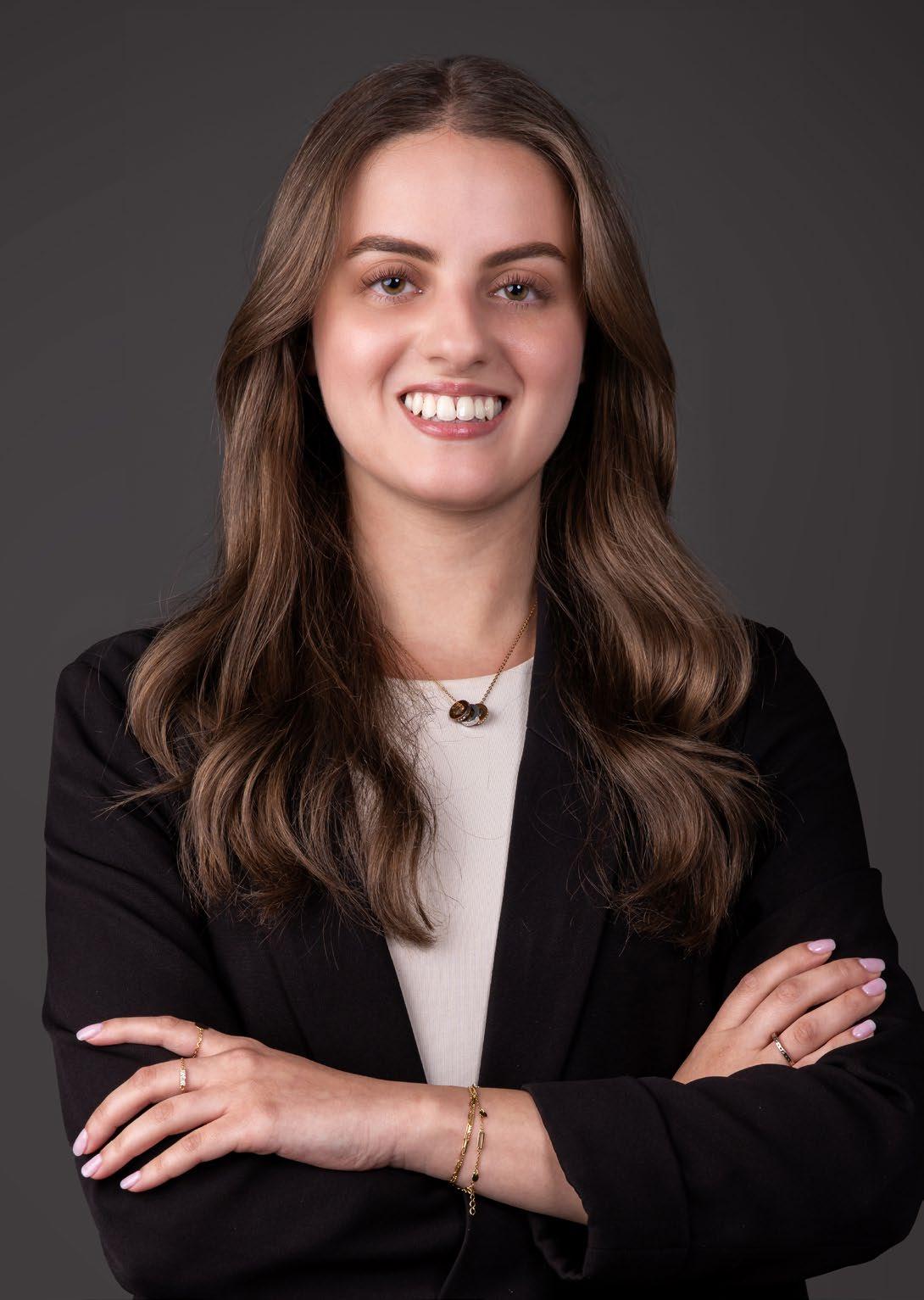
“Zain's experience has been instrumental in guiding the app’s evolution, from its clean design and intuitive tools to the way it helps clients”
Zain’s path through Strategic Operations and Data Analytics gave her a deep understanding of how advisers work and what clients need. That experience has been instrumental in guiding the app’s evolution, from its clean design and intuitive tools to the way it helps clients engage with insights, documents, and planning calculators at their own pace.
Zain continues to help drive forward Skybound’s ambition to combine human advice with smart technology. Her efforts help ensure that wherever our clients are in the world, their adviser - and their finances, are always within reach.




Plan, Track, Manage & Succeed with the Skybound Wealth App. Exclusive to our Clients. Download the app today!

Scan the QR code or click here to download the app.



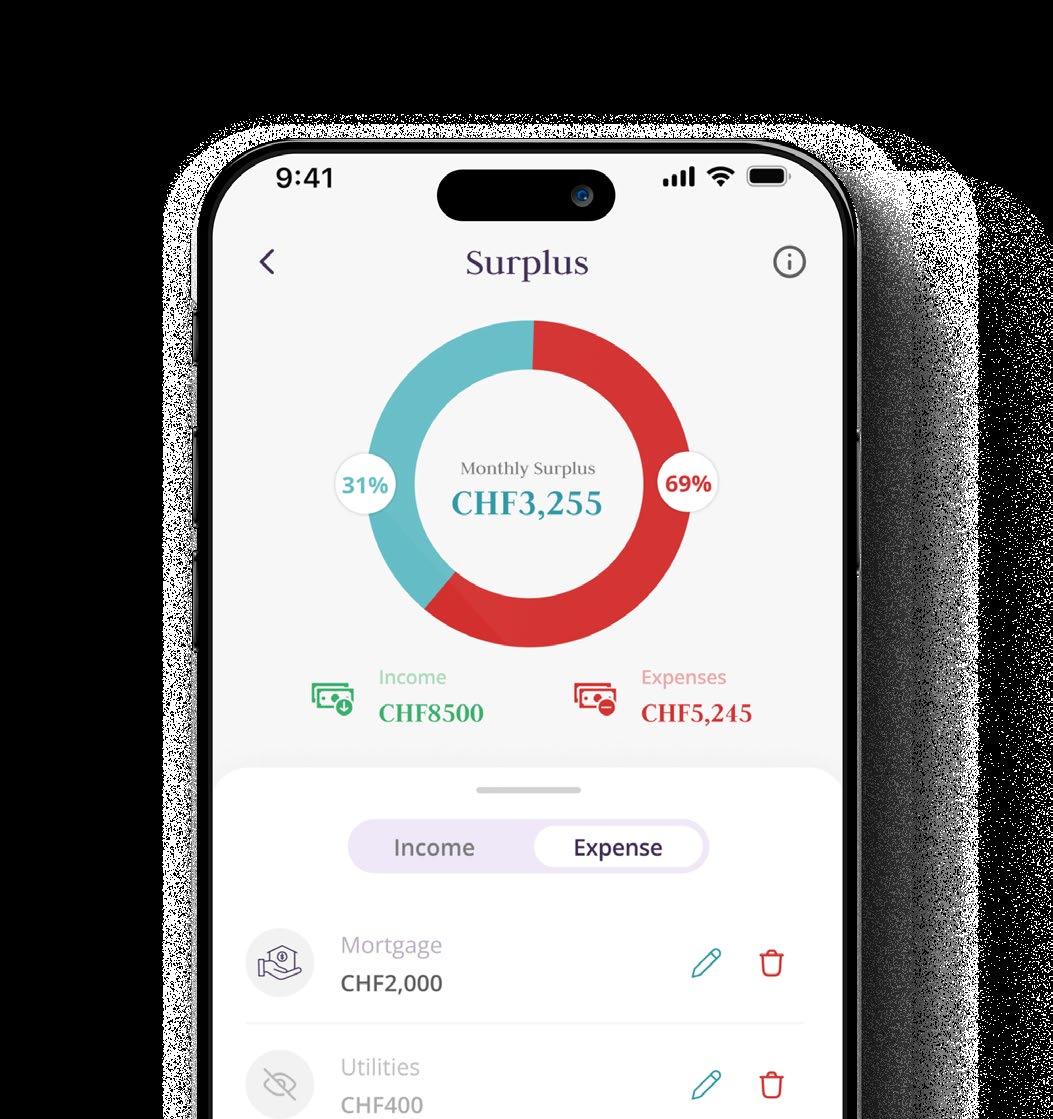
Award winning, independent & internationally regulated financial planning & pension advice through life’s journey.
At Skybound Wealth Management, we are always looking for ways to help you keep more of your money and ensure it works just as hard for you as you did to earn it.
Skybound Wealth is part of a group of regulated entities operating across multiple jurisdictions. With specialist product divisions covering areas such as Pensions, Repatriation, and Investments, and dedicated teams supporting internationally mobile individuals from regions including the UK, US, South Africa, Australia, Europe and beyond, we are perfectly placed to support you, wherever life and work may take you.
Scan the QR code or click here to contact your Skybound Wealth Financial Adviser today for more information about any of the topics seen in this publication.